






by Abby Thomas, a first-year in meteorology In partnership with the NC State Broadcast Meteorology Club
Mar. 6 - Mar. 19




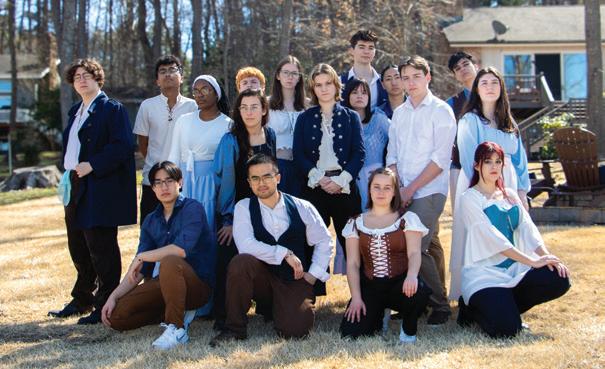

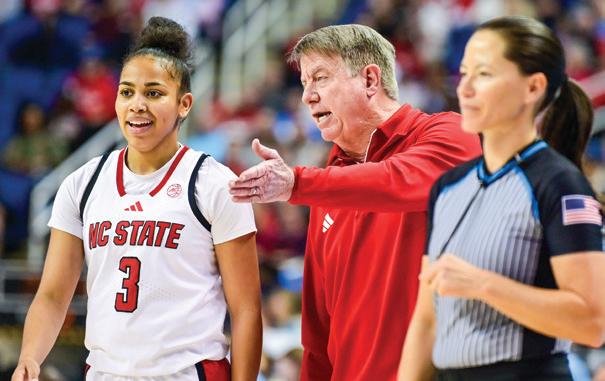
Editor-in-Chief



Floral displays spread around the North Carolina Museum of Art during NCMA Art in Bloom Media Day on Tuesday, March 18, 2025. During Art in Bloom, a floral fundraiser in support of the North Carolina Museum of Art, visitors will be able to enjoy the creativity of floral designers from across the state and beyond who interpret works of art in the People’s Collection.
Hillsborough Street, NC State’s historic social and economic hub, continues to evolve and expand, but pockets of undeveloped land raise questions about the future of the corridor.
Among the most visible is the site at 2510 Hillsborough St., a skeletal frame of a project stalled years ago. The site, located next to Target, was originally purchased by a developer in 2014 for $535,000. It gained approval for a seven-story apartment unit, but the project stalled and the bank foreclosed the property in 2021 at a value of $3.2 million.
CityPlat, a Raleigh and Charlotte-based real estate firm, bought the property months later for $1.25 million.
Pat Moore, a co-founder of CityPlat, said he acknowledges the challenges in redeveloping the site.
“We downscaled the original design,” Moore said. “… For one reason or another, it was the cost of construction to build that out, it was just too expensive at the time.”
The site was rezoned in 2022 for a mixed-use two-story building including a restaurant, bar and retail.
Moore cited rising construction costs, challenging interest rates and the complexities of renovating an existing structure as major hurdles. The company is currently exploring its options, including partnering with another developer or potentially selling the property to a developer with greater resources.
“Costs, just everything — construction costs, interest rates have changed, trying to take what was built and modify it to an extent,” Moore said. “A lot of times, renovating a building is a lot of times way more expensive than building something from scratch. So we’re trying to figure out exactly how to maximize that opportunity. And materials costs and labor costs have gone through the roof even since COVID

hit. I mean, everything’s gone sky-high.”
Moore said due to these reasons, CityPlat has no current plans to develop any of its sites.
“Our company kind of changed directions in the midst of the project,” Moore said. “So we would definitely sell it, but if a suitor doesn’t come along, we’re going to develop it.”
CityPlat also owns 3415 and 3413 Hillsborough St.; the former site of Arby’s and an empty, overgrown plot, respectively.
CityPlat bought 3415 Hillsborough St. for $2.5 million in 2022, as the final piece of land for a proposed mixed-use development for over 275 apartments. In a press release, CityPlat said construction was set to begin in three years, but Moore said that goal is no longer feasible.
Moore said the company recently obtained rezoning approval for vertical development at the former Arby’s site, but CityPlat has no plans to redevelop the property at the moment.
NC State’s weekly log of major incidents across campus.
ARREST
Sigma Nu March 16, 2025 at 9:27 a.m.
A student damaged a window to enter the building prior to the building being reopened following spring break.
VIOLENCE AGAINST WOMEN
The Greens Apartments March 15, 2025 at 12:16 a.m.
A subject was arrested following a domestic violence incident.
Currently, Cali Burgers is housed in the former Arby’s location.
“We’re not ready to go vertical,” Moore said. “You don’t want to necessarily lose the income of the property before you’re ready to go vertical with it.”
Moore said there seems to be an endless supply of hoops to jump through to get a project off the ground on Hillsborough Street, including friction with local municipalities and individual inspectors on top of already overwhelming costs.
“There’s so many issues,” Moore said. “It takes experience and it takes money. That’s it. The more you do it, the better you get at it. But that’s the bottom line, and that’s why the barrier of entry is so, so high. It’s because of the amount of money you have to raise to get into it. And it’s just the product of a growing area, essentially, there’s no small projects anymore.
Everything’s millions now.”
The only active construction on the corridor is Core Spaces’ Hub on Campus at 1707 Hillsborough St. The apartment complex will be Hillsborough’s largest, planning for 661 units and up to 2,000 beds.
Core Spaces, headquartered in Chicago, has developed 29 “Hub on Campus” properties near campuses across the country.
Core Spaces declined to respond to Technician’s request for an interview.
Another prominent undeveloped site is located at 3414, 3412 and 3402 Hillsborough St., next to Snoopy’s Hot Dogs & More.
The city rejected a rezoning request for the property in 2015, which would have allowed for a five-story apartment building and parking deck named Meredith Heights.
The site was sold to Jim Zanoni of FMW Real Estate, a Charlotte-based developer, in 2016. Wake County lists the land’s current value at $7.95 million. It is currently zoned as a threestory mixed-use office building, but the site remains a barren plot with tree stumps.
Zanoni has acquired and developed multiple properties on Hillsborough Street in recent years, including 2604 Hillsborough St., the “Live on Hillsborough” apartments next to the old Wells Fargo bank and on Dan Allen Drive, 1301 Hillsborough Apartments and a number of other properties on Park Avenue and Ashe Avenue.
Zanoni has not responded to emails from Technician.
TRESPASS VIOLATION ARREST
J.C. Raulston Arboretum March 13, 2025 at 8:52 a.m.
A subject was issued a trespass warning after gaining access to the area before opening. At 2:02 p.m., a subject was arrested for repeated trespass on the property.
Dan Allen Dr./Hillsborough St. March 11, 2025 at 10:03 p.m.
A subject was arrested after being found driving with a revoked license, simple possession of marijuana, possession of marijuana paraphernalia, failure to burn headlamps and resisting, delaying or obstructing an officer.
Kate Denning Editor-in-Chief
Students, faculty, staff and community members gathered in Talley Student Union Tuesday afternoon to celebrate the announcement of Chancellor-Elect Kevin Howell, NC State’s 15th chancellor.
Chancellor Randy Woodson provided opening remarks, where he championed Howell’s long-time ties to North Carolina and the University.
“He knows our history,” Woodson said. “He knows our founding. He understands what a land grant institution is. He understands our commitment to be in every county, plus the Cherokee Nation, in this great state. He understands the commitment we have to the people of North Carolina, and he understands the passion that those clientele that we serve have for this great University.”
Vice Chair of the Board of Trustees Ed Stack echoed the sentiments of Howell’s qualifications and connections to NC State, invoking Howell’s history serving as student body president in the 1987-1988 academic year and his time as a student athlete on the wrestling team.
“This candidate embodies the very spirit of NC State,” Stack said. “He has spent his career building relationships through honest, effective communication, earning the respect and friendship of all who know him, from his small-town North Carolina roots to his ability to navigate both the legislative offices on Jones Street and the boardrooms of Fortune 500 companies. He knows how to connect with people. Our chancellor-elect’s ties to NC State run deep.”
As Howell entered the stage, he received a standing ovation and a lengthy round of applause. He thanked those who supported him
continued from page 3
Jeff Murison, president and CEO of Live It Up! Hillsborough Street, a community improvement organization dedicated to the upkeep of Hillsborough Street, said the situation of vacant lots isn’t ideal, but a solution has not been found amid this period of historically high costs.
“A great solution has not developed yet, and so they’re continuing to explore options,” Murison said. “And it is unfortunate, it’s an eye so we’re on the street, a one percent completed property is not ideal.”
Murison said it’s important to note that Ra-
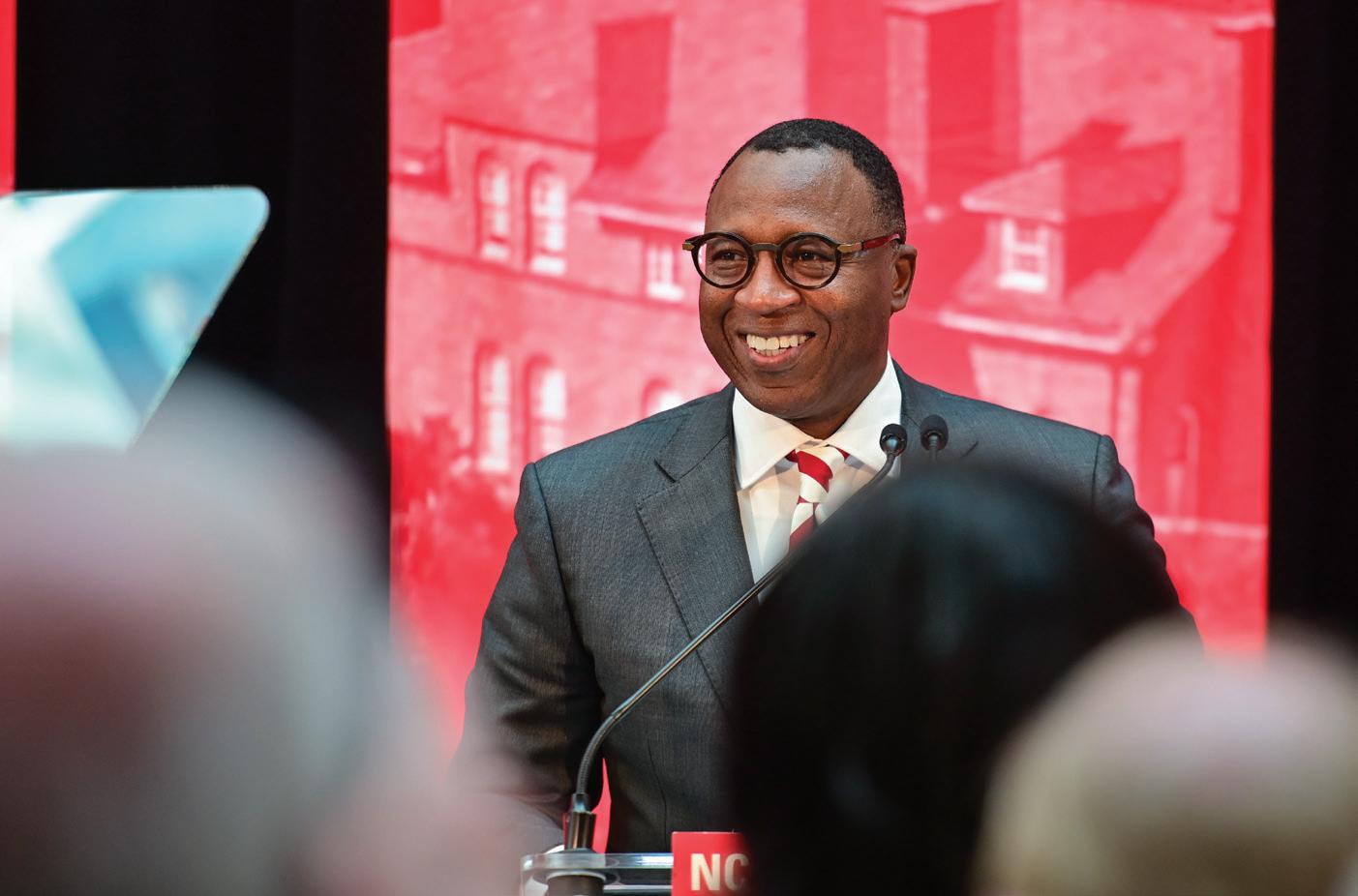
JERMAINE HUDSON/TECHNICIAN
Chancellor-elect Kevin Howell smiles after walking on stage during the new chancellor announcement in Talley Student Union on Tuesday, March 18, 2025. Howell will be the 15th chancellor of NC State and the first Black chancellor. “I’m humble, I’m excited and I’m ready,” said Howell.
during the search process and affirmed his enthusiasm for the role.
“I’m humbled, I’m excited and I’m ready,” Howell said.
Howell spoke directly to students and commended their impact on the University.
“Students, you’re the real reason we’re here today,” Howell said. “Whether you’re a firstgeneration college student, whether you’re a military-affiliated student, a transfer student or you were just simply born into a Wolfpack family like the rest of us — in you we see hope. In you we see prosperity. It’s your ability to inspire innovative thinking and solve complex challenges. Never forget that it’s your superpower, and I cannot wait to be
leigh isn’t the only city facing this problem.
“Throughout the corridor, the last few years have been very challenging for financing, for new construction, real estate and market,” Murison said. “ … This is not Raleigh — this is happening all over the country, to have staff stalled while they wait for the market conditions to change.”
Jonathan Lambert-Melton, an at-large member of the Raleigh City Council, said vacant properties on lively streets such as Hillsborough can interrupt the cohesion and overall personality of the area.
“When you’re walking down Hillsborough Street and you walk past that empty spot next to Target, it’s sort of an abrupt disruption to the otherwise very vibrant and pedestrian-friendly street,” Melton said. “Too many sites like that on Hillsborough Street or downtown, they start
your chancellor.”
As for NC State staff and faculty, Howell said he looks forward to continuing to build upon the foundation they have laid.
“NC State is a community of hard-working, talented professionals,” Howell said. “It’s no wonder we are ranked fourth amongst the best employers in North Carolina. So to our nearly 7,500 staff members, thank you for your commitment to collaboration, creativity and teamwork. What you do here makes a difference, and you have my full commitment to continue to make NC State a place where we all can be proud to work. We’ve heard it said time after time that a rising tide lifts all boats. Nowhere is that more true than at NC State
to add up, and they start to lend themselves to a sense of their place, not being safe, a place not being invested in.”
Despite these challenges, Melton emphasized the importance of supporting small and larger developments in a balanced manner.
“I think they’re complimentary,” Melton said. “If you’re out and about now, you notice that all of these areas are growing together. Village District has become denser, more apartments, a hotel is being built. Hillsborough Street is becoming denser.”
To address the affordability crisis and rising construction costs, Melton supports initiatives like zoning reform and incentives for affordable housing.
University.”
As he drove to campus for the celebration at Talley Student Union, Howell said he recalled the day he arrived at NC State as a student and compared it to where he stands today. Coming to school in Raleigh from his hometown of Shelby, North Carolina was a big deal when he was a student, he said.
“I often think about my mother and father and perhaps what they would say at this moment, but neither one of us could have imagined the doors that would be opened for me because of an NC State degree,” Howell said. “If you want to do one thing today to celebrate this day, think about the people in your own lives that brought you to NC State, that told you about what a wonderful University this truly is.”
The event concluded with a performance of the Red and White Song by the NC State marching band and a celebratory balloon release.
Howell is an NC State alum, where he graduated with a bachelor’s degree in political science in 1988. Howell will be the first Black chancellor and the third NC State graduate to lead the University.
He currently serves as the chief external affairs officer at UNC Health and an advisory board member for NC State’s Friday Institute for Educational Innovation. NC State announced Howell’s first day on the job will be May 5, 2025.
“I stand before you today on the shoulders of giants,” Howell said. “So this University, together, we will be bold. We will break barriers. We will continue to think and do outside of the box in ways that drive us to solve the grand challenges of the world, but while keeping our hearts and our minds rooted in our mission and dedicated to one another.”
“We need to continue to support these zoning reforms and not attempt to go backwards just because sometimes change is scary,” Melton said.
Additionally, Melton said he advocates for mixed-use developments along transit corridors, which can help reduce costs and promote sustainability.
In terms of future plans for the corridor, Melton said he sees it becoming part of a larger urban fabric connected to downtown Raleigh.
“We need to make areas like Hillsborough Street, like downtown, like midtown, North Hills, we need to support them; we need to make them a priority,” Melton said. “They need to be vibrant and safe and thriving, because that’s where we get our tax money, and that’s how we are able to provide all the necessary city services while keeping your taxes low at your home.”
Adam Sawafta Correspondent
“The White Lotus,” HBO’s hit series by creator Mike White, follows a new murder each season at one of the internationally luxurious White Lotus resorts. The show focuses on the dynamics between the wealthy guests, the staff and the locals, while showcasing class differences and creating tensions that strengthen the barriers between the three groups.
A popular theory by critics and fans alike is how the series follows the seven deadly sins, each season taking on a different sin as its main focus point — season one is greed, season two is lust. White has confirmed that one and two follow greed and lust; however, he has not elaborated on if it is the seven deadly sins or just simply coincidence.
It has left many to speculate what sin season three may revolve around. Psychoanalyzing each character’s behavior and the common tropes the show tends to follow, like the cause of death being accidental or giving us the answer early on only for it to click at the end of the season.
First, in season one — greed — the audience is introduced to Shane Patton, played by Jake Lacy. His greed centers around his desire to be given access to luxuries which are unavailable, like a master suite, leading him to even the point of blackmail to obtain it. Mark Mossbacher, played by Steve Zahn, begins questioning his masculinity with the fact that his wife is the breadwinner of their family, seeking more respect from his friends, family, society or even his subconscious.
Some of the few examples of greed in the first season give us a sense of what the wealthy guests struggle with internally. A common theme among them is self-destruction in order to deal with these issues. This comes at
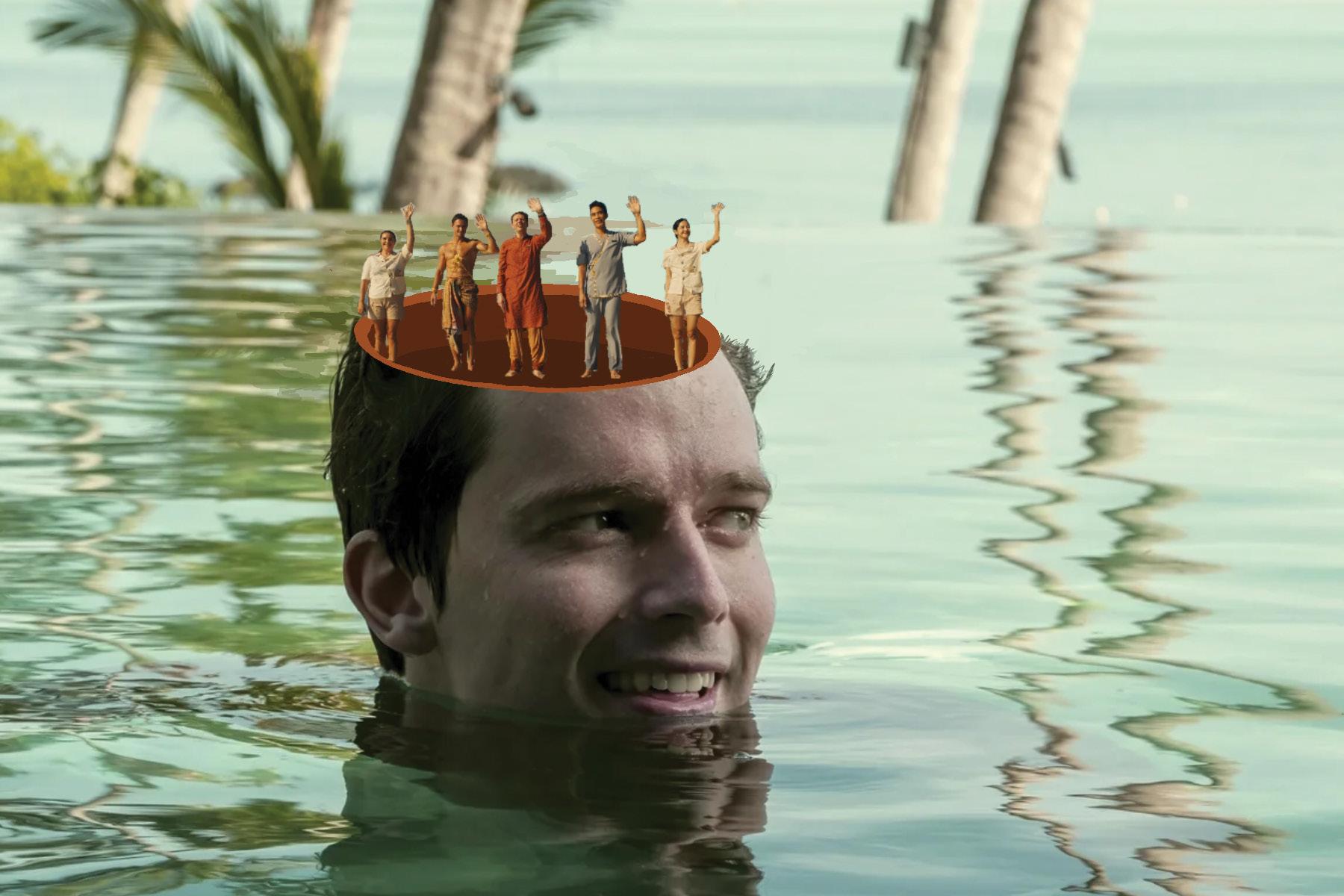
the expense of manager Armond’s sanity and Kai, a local played by Kekoa Kekumano, who is pushed to commit a crime by one of the guests and is jailed for it.
Season two is lust. Cameron Sullivan, played by Theo James, is a successful investments manager who has had many affairs off-screen. At least three affairs occur on-screen behind his wife’s back. One of them being with Harper Spiller, played by Aubrey Plaza, an affair that is left up in the air; the mystery of it leading Daphne Sullivan, played by Meghann Fahy and Ethan Spiller, played by Will Sharpe, to have one of their own.
There are many interesting factors that go into the affairs of season two. First, Cameron and Harper’s affair only, supposedly, happens because Harper believes Ethan cheated, which did not happen. Ethan and Daphne only sleep together under the assumption the previous affair did happen, which they are unsure of.
Ultimately their fears consume them, leading lust to be all-consuming.
In the same season, Dominic Di Grasso, portrayed by Michael Imperioli, embarks on the trip to Italy with his son and father. We learn that he and his son’s mother do not communicate anymore due to Dominic’s own lustful endeavors.
The season showcases how lust, acting as a temporary desire, fractures dynamics when cravings overtake other raw and more permanent emotions. If the first season is the desire for a sense of respect and wealth and season two is the desire for sexual satisfaction that only leads to bad will, it begs these two questions: Which sin will deconstruct the guests of White Lotus season three? Does the show follow the sins of the human flaw as a whole?
Despite that, it doesn’t stop the seven deadly sins from being a part of the human experience, and therefore the show. We can expect the on-
going themes to continue like the wealth that one must have to be a guest at The White Lotus and the kind of person that makes them. The staff becomes cracked with time going through a constant cycle, and the locals are twisted in the stories of the wealthy guests, being tricked or being the trickster.
Spoiler alert for the first three episodes of season three.
I predict the sin will be pride for the third installment in the series. Each new group of guests has a prideful nature. In the Ratliff family from North Carolina, most of the family consider themselves better than others and have a classist view of the world.
Similarly, Jaclyn Lemon and her group of friends have fragile pride regarding their beauty and how their status is seen by their friends.
Rick Hatchett embarks on a journey to get vengeance for a father that he was robbed of, and believes his life of torment came as a direct result of his father’s murder. His pride is seen to be in what he believes he deserves for enduring great deals of tragedy, while his girlfriend Chelsea fights to be the driving force in healing Rick’s tragedy.
Then there is Gaitok, one of the security guards whose lack of pride is a driving factor to obtain a higher position to impress Mook and gain the respect of the staff. Belinda Lindsey seems to be the outlier in the characters, almost as a stand-in for the audience and their perception of what goes down at the White Lotus. Whether it is a lack of or an overwhelming amount of pride, the prominent cast each struggles with this sin, each on their own journey regarding their individual pride. It begs the question: Whose prideful journey will get the better of them and lead to their demise?
Dae Reed Staff Writer
NC State a cappella group Chordination competed at the International Competition for Collegiate A Cappella South semifinals at the Carolina Theatre in Durham on March 8, winning two special recognition awards at the competition.
The event was a collection of the top two groups from quarterfinals around the South. Chordination was the only group from North Carolina that qualified for the event. Other performance groups were from schools in Tennessee, Florida, Georgia,
South Carolina and Mississippi.
Elise Boorom, a fourth-year studying biological sciences, has been a member of Chordination for four years and is currently president. She was a soloist for the first of three movements in Chordination’s set, an arrangement of the song “Come Along” by Cosmo Sheldrake.
“We arrange all our own music, we choreograph all our own songs and sets and we’re completely student run,” Boorom said.
To be selected for quarterfinals, the group had to make a video submission. From there, they performed against ten groups from neighboring states. They tied for first
with Ascension from East Tennessee University. Both advanced to semifinals.
Out of only five years competing, the group has gone to the semifinals four times.
“Semifinals is a huge deal, because if you get to that point, you’re one of the best top 10 groups in the entire south region of the United States,” Boroom said.
This year was the first time Chordination won any special recognition at semifinals.
Out of the ten groups, Chordination was given two special recognitions. They were awarded outstanding choreography for the work of K’Mya Williamson, a secondyear in Africana Studies, and outstanding
vocal percussion, for guest member Josh Thompson, who is not a student at NC State. Thompson also won this award in the quarterfinals.
“It’s my first year as a performance director, so it feels good,” Williamson said.
This past summer, group leadership decided they really wanted to tell a story, rather than go for the more common approach of a medley with a thematic connection. They picked shipwrecked as their theme, and after pitching and voting on
CHORDINATION continued page 6
London Fashion Week is among the most anticipated fashion events of the year. As one of the most prominent cities in the world, it draws in a myriad of must-see collections. From classic brands to up-andcoming designers, if you’re looking to spot the next big trend, it’s the place to be.
There are many “fashion weeks” that occur in various cities throughout the year. The four most recognizable weeks are in Paris, Milan, New York City and London. They happen twice annually, around February and September, and display clothing that will be “in season” about six months into the future.
However, the shows aren’t just about allowing consumers to do some very premature shopping. They also provide an opportunity for designers and brands to showcase their hard work and provide inspiration for other artists, like fashion students.
Lainey Volz, a third-year studying fashion and textile design, is currently studying abroad at the London College of Fashion. She attended a London Fashion Week show hosted by the brand LEM.
“It was a crazy road to get there,” Volz said. “For safety, they don’t launch the London Fashion Week schedules that far out because they don’t want people to be able to figure out where expensive clothing and jewelry is going to be.”
Fashion week runway shows are often in-
continued from page 5
song choice, they arranged their set front to back.
“We collaboratively arrange everything we do,” Boorom said. “And it’s so cool because you can ebb and flow with other people’s ideas.”
After creating a demo, the entire group rehearsed for months to compete. Their performances were judged on harmonies and choreography.
In the set, Boorom played a pirate captain. Their costumes were reminiscent of sailors and the stage was lit blue.
This year was the first time the group consulted a professional choreographer and composer for tips on improving their piece. Boorom said it was helpful to get outside input.
Their set also included renditions of
vite-only, and with such ambiguous scheduling, it can be difficult to secure a spot. Luckily, Volz and her friend reached out to LEM and were invited to attend the show.
“I was overwhelmed with excitement because this has been a lifelong dream,” Volz said.
Fashion week shows are revered for embracing a high performance quality that uses various elements such as the venue, makeup and models to accentuate the artistry of their designs.
LEM’s show was held at the Royal Academy of the Arts.
“It suited the environment very well because everything was very painterly. A lot of fabrics looked like paint strokes,” Volz said. “It all seemed inspired by classical art.”
Arynn Baginski, a third-year in fashion and textile design, is also studying abroad in London and had the opportunity to attend the LEM show and a showcase by the graduate students in Fashion and Textiles at Central Saint Martins.
Baginski explained how attending fashion shows and studying abroad has inspired her to think outside the box with her coursework and designs.
“You’re encouraged to be more avantgarde with the use of different materials,” Baginski said. “This is a chance to learn different design processes and take new classes.”
Fashion weeks are also great places to spot incoming trends. The February and
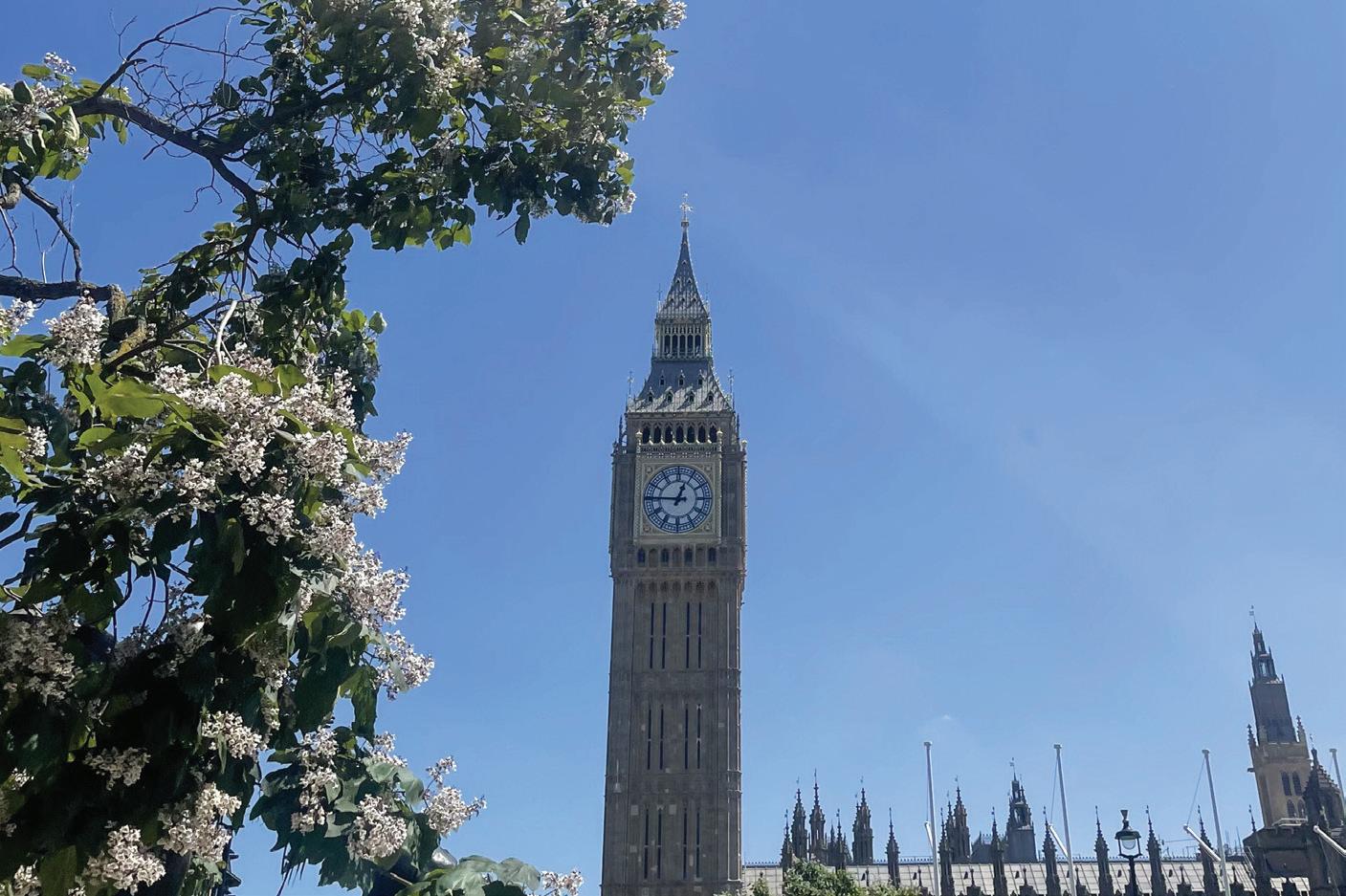
September fashion shows are dedicated to “ready-to-wear” fashion. This means that most pieces will go directly from the runway into stores.
Apart from directly shopping new collections, there are often specific colors, silhouettes and fabrics that show up consistently throughout many shows. This is often an indication that you should start digging through your closet for items with those qualities, as they’ll likely be trending during the upcoming season.
“The cool thing about the Central Saint Martins’ show was that, for a lot of people,
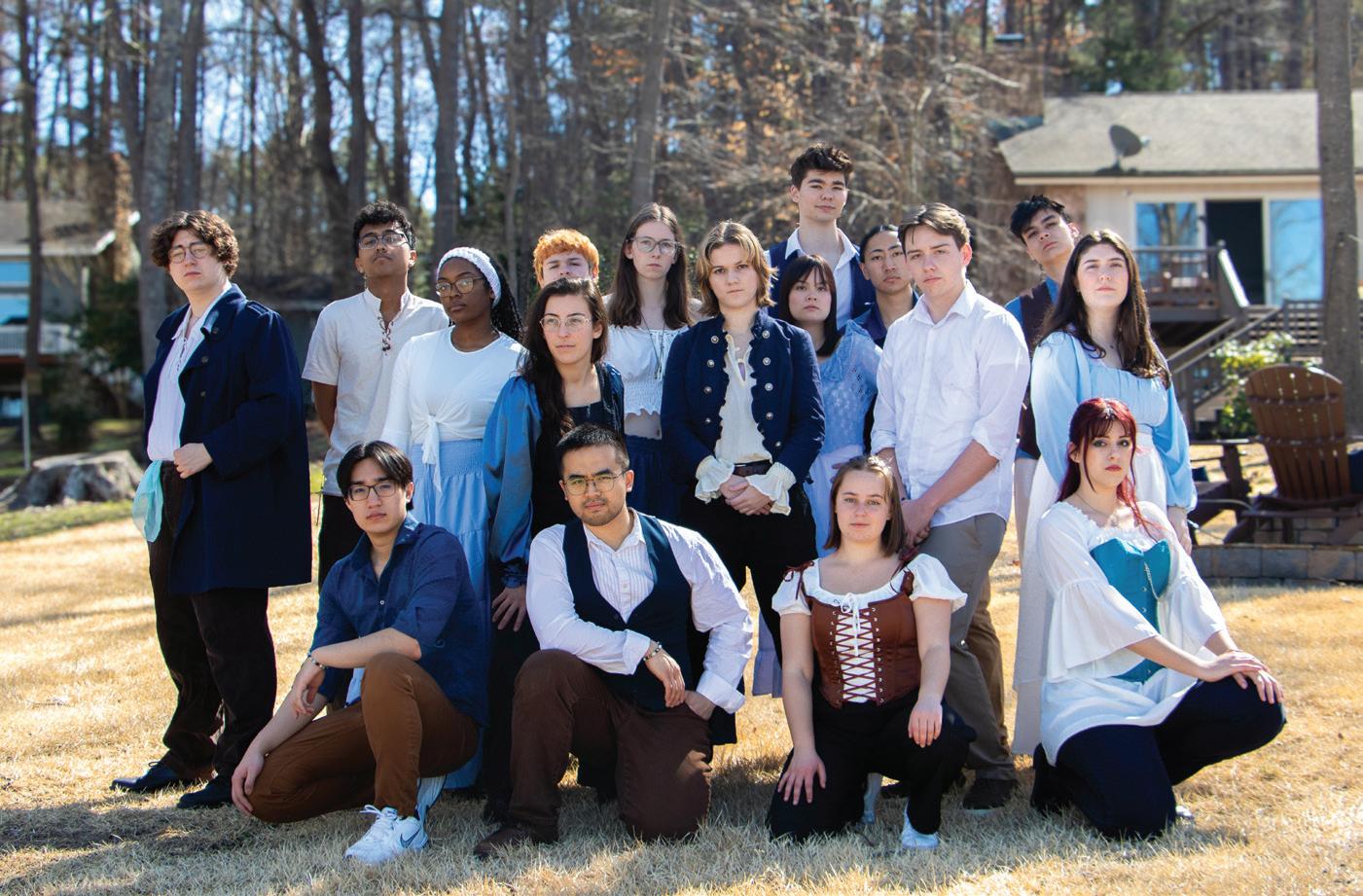
“Storm Coming” by The Wailin’ Jennys and “Let Me Drown” by Orville Peck. Chordination members sang their way through the story of a rowdy pirate ship seduced by a
trio of sirens, the tragic crash and the lone survivor mourning his lover. They are not just a live performance group. Alexa Vierschilling, a fourth-year
this is how they launch their brand, so they’re exploring a lot of different things,” Baginski said. “However, I have been seeing a lot of sleeker silhouettes.”
Sleek silhouettes, painterly prints, boat necks and lace have all been spotted at London Fashion Week and are predicted to be trends for Fall/Winter 2025.
Trends come and go, so remember to check your closet and local secondhand stores before buying anything new. Personal style and sustainability are always a fashionable option.
in animal science and vice president, said they also record music and publish it, and hope to get out more music soon.
“We’ll have a new EP coming out,” Viershiling said. “Five songs and then a single with a music video, both hopefully in the summer.”
The ICCA South semifinals concluded with first place going to the Pitchmen, from Belmont University. They will advance to the ICCA Finals held in New York City on April 26.
Walking away with two outstanding recognitions and semifinalist status, Chordination members seemed very happy with their win. Boorom said they are proud of their work this year so far.
“We’re really lucky to have so many really talented musicians,” Boorom said. “We’ve grown so much over the past five years of being a group. We’re really grateful to have such supportive alumni, and we’ve made a lot of friends within the a cappella community as well.”
A database released on Feb. 11 by U.S. Senator Ted Cruz has put millions of dollars in “woke DEI” National Science Foundation grants awarded to NC State under scrutiny.
Cruz, chairman of the Senate Commerce Committee, identified over 3,400 grants totaling more than $2.05 billion that he alleges were diverted to projects promoting diversity, equity and inclusion or “neo-Marxist class warfare propaganda” during the BidenHarris administration.
Cruz wrote in a report that “DEI initiatives have poisoned research efforts, eroded confidence in the scientific community and fueled division among Americans.” He released the database, which served as the backbone for his October 2024 investigative report, to expose what he calls the Biden administration’s weaponization of federal agencies.
The Trump administration has since taken action, with President Donald Trump signing an executive order to terminate all DEI programs, offices and positions within federal agencies. The NSF has frozen its annual grant review to comply with this directive.
The database identifies 28 NSF grants valued at approximately $12.6 million awarded to NC State, not including millions more in collaborative projects between NC State and other institutions. These grants support a range of research, from studying coastal algae to developing prosthetic hands. Some grants are aimed at STEM education with modules designed to better prepare prospective grade 6-12 mathematics teachers to teach in increasingly diverse classrooms.
Holden Thorp, former chancellor at UNCChapel Hill and editor-in-chief of Science, the American Association for the Advancement of Science’s peer-reviewed journal, said many of these grants were likely misidentified. For example, he said there were grants in organic chemistry that had cis and trans isomers in them, and these terms have nothing to do with gender identity.
Veena Dubal, a professor of law at the University of California, Irvine, and general counsel of the American Association of University Professors, said the targeting of DEI initiatives is part of a broader ideological

assault on higher education.
“This term, DEI, has become a red herring for not an actual debate or discussion around issues of equity or issues of racial inequality or issues of marginalization, but instead, it has just become a political signifier for ideas and people that the administration doesn’t like,” Dubal said.
Dubal said restricting DEI efforts will have devastating impacts on the recruitment and retention of underrepresented groups in academia.
“That is not in the interest of the public good,” Dubal said.
The freeze on the annual NSF grant review raises concerns about academic freedom and the future of scientific research.
Thorp said academic freedom is crucial for driving innovation and technological advancements.
“The whole point of academic freedom is to allow people who are experts in their field to exercise their informed judgment about the right things to teach and do research on,” Thorp said.
Dubal said the AAUP views these funding cuts as a fundamental attack on academic freedom.
“This is creating an environment where certain forms of research are discouraged or censored,” Dubal said.
Some examples of targeted grants at NC
State include:
$1,602,937 for the North Carolina Center for Coastal Algae, People and Environment, an effort to advance scientific knowledge on the risks of harmful algal blooms in NC coastal waters, including the Pamlico-Albemarle Sound system.
$500,000 for engineering ultra-wide bandgap III-nitride devices for highly efficient and robust electronics.
$1,123,487 for a STEM education project aimed at improving diversity and inclusion in large-scale participatory science projects, which seeks to engage historically excluded groups in scientific research and informal science learning opportunities.
$381,052 for engineering versatile wearable robots for the rehabilitation of children with gait disabilities.
Most of these research projects include vocabulary surrounding prioritizing diverse hiring practices, such as mentioned in A North American monograph of the powdery mildews’ research proposal, which was awarded $1 million from the NSF.
“Fungal biology has historically failed to recruit diverse researchers,” the proposal states. “With this in mind, we will highlight diversity and inclusion in our personnel selection process.”
Other projects, especially regarding developing prosthetics for people with disabilities,
have no mention of diverse hiring practices in their proposals, such as the project, Improving the future of retail and warehouse workers with upper limb disabilities via perceptive and adaptive soft wearable robots.
While the project itself has no mention of hiring diverse personnel, its purpose is to better equip people with physical disabilities for the workforce.
“The long-term goal of the project is to improve the quality of work, productivity and employment of people with disabilities, who are the nation’s largest minority and untapped labor force,” the proposal states.
Thorp said Cruz’s use of terms like “neoMarxist class warfare propaganda” to describe these grants is a political tactic to undermine higher education. He said he believes this rhetoric is “a gross exaggeration” and serves to brand higher education as overly politicized.
“Most faculty members are teaching the students who show up in their classes, doing the best they can to do that, doing research on problems that they think are important,” Thorp said.
Thorp said the freeze on NSF grant reviews could lead to job losses and discourage scientists from pursuing careers in the U.S., ultimately harming the nation’s scientific progress. He said delaying grant disbursements could cause a disproportionate amount of job losses in research-heavy areas such as the Triangle, which could lead to scientists seeking opportunities abroad.
“If we’re trying to build a scientific workforce in this country that relies less on people from outside the United States, then it’s hard for me to see why you would stop any program that’s getting talent into science,” Thorp said.
It remains unclear how the NSF review will impact these specific NC State projects.
In an email statement to Technician, University spokesperson Mick Kulikowski said, “The University is working with various partners to gauge impacts of any changes to federally funded sponsored programs.”
“If the administration, who do not understand the value of it, decides that ‘Oh, we don’t need this class’ this is going
how this could impact research at the University, including the potential for censorship of certain topics or
should oppose the federal government’s efforts.
Some graduate students are expressing concern surrounding the Trump administration’s executive order ending diversity, equity and inclusion programs as well as the University’s changes in response to the order.
DEI-related mandated course credits have been removed for all UNC System students, and the University has ended programs such as the Black Male Initiative, a living and learning village.
Lucie Heron, a graduate student in English, said the University has not been clear about how the changing DEI landscape will affect students.
“A lot of graduate students who are also instructors have felt particularly uncertain about how these anti-DEI measures and these things being scaled back or rolled back affect us,” Heron said. “And [we] have not received as much clarity about how those things affect us, whether that be syllabus material, things that we teach, if those things will be censored in any sort of way.”
Heron also mentioned many graduate students are concerned about how the recent executive order could impact students who are immigrants.
“I know a lot of our students have been concerned about being able to travel back home and if they’ll be able to come back,” Heron said.

Hwa Huang, a doctoral student in earth and atmospheric sciences and a member of the Graduate Students Union, said the elimination of DEI programs and the DEI course requirement is particularly concerning for workers in the College of Humanities and Social Sciences. Huang said he is worried about cuts to pay and conditions for graduate workers in the college.
backgrounds represented at the University.
“I think that the whole premise of why these DEI measures have been in place goes back to the civil rights movement,” Heron said. “And because of that, we’ve seen an increase in students being represented from communities that have not been represented or have been purposefully excluded in the past.”
Huang said he is concerned about
government’s efforts where possible.
“It’s important for the University to communicate with its students more directly about these concerns that students have, facing funding, facing discrimination,” Heron said. “I think the University should not comply with the government’s threats to these infringements on our free speech.”
Huang agreed that the University
“First and foremost, we need them to come out and say that they will prioritize protecting student rights,” Huang said.
Huang said the union is participating in a letter campaign, in which 174 letters were sent to University administration urging them to oppose the changes and commit to “protecting student rights.”
The University did not immediately respond to a request for comment.
The North Carolina Republican Party responded to Technician’s request to comment with an email statement, citing “illegal discrimination” as a core reason for their opposition of DEI in universities.
“President Trump’s executive orders are based on two things: ending illegal discrimination and restoring meritbased decisions,” the Republican Party wrote. “Colleges and universities have gone far beyond this approach, including the U.S. Supreme Court’s decision to end affirmative action. Especially in regards to universities which receive funds from taxpayers, these policies have been detrimental. We commend President Trump and his administration for taking these actions that will benefit all North Carolinians.”
Heron said students should be concerned about what they say are infringements on the right to freedom of speech and the changes to DEI programs.
“DEI doesn’t just apply to certain groups; it’s for everyone, right?” Heron said. “This has far-reaching consequences for everyone, and yes, I think the attack on free speech should be concerning.”


Dae Reed Staff Writer
Various programs at NC State are grappling with cuts to funding and changes in DEI policy.
Over the first two months of the Trump administration, diversity, equity and inclusion programs have been dismantled top-down. Many changes are being made to programs related to housing, community and careers in order to comply with federal and state expectations.
Programs focused on uplifting marginalized students like living and learning villages, certain study abroad scholarships and programs, pre-college programs and internships across disciplines are being impacted.
Technician reached out to University spokesperson Mick Kulikowski for comment on how NC State’s study abroad program may be impacted by cuts to federal funding.
“NC State is working with various partners to gauge potential impacts of any changes to federally funded programs,” Kulikowski wrote in an email.
Ronnie Chalmers, director of recruitment and strategic initiatives, wrote in an email statement to Technician that pre-college programs are being reassessed based on UNC System Directives and federal guidelines.
“On Feb. 14, 2025, the U.S. Department of Education’s Office for Civil Rights issued a letter clarifying the nondiscrimination obligations of educational institutions under Title
VI of the Civil Rights Act of 1964,” Chalmers wrote. “This guidance emphasizes that programs must be inclusive of all students, irrespective of race, color or national origin.”
The UNC System Office responded to this letter by issuing directives to reassert the expectations of pre-college programs. NC State is assessing its pre-college initiatives to ensure compliance with all expectations.
Chalmers wrote their goal is to provide equal opportunity for all students engaging in precollege programs, while also complying with federal standards.
“During this period of evaluation and adjustment, some pre-college programs may be temporarily suspended or restructured to meet the updated compliance standards,” Chalmers wrote.
Impacted programs include CAMINOS, which serves Hispanic and Latinx students, a Black students program called Emerging Scholars Academy and the Native Education Forum. These programs are no longer visible on the NC State website for pre-college programs.
Living and learning villages at NC State are communities made to gather students with common interests or identities. Villages centered around identities and may be under threat include Native Space, Women in Science and Engineering and Women of Welch.
Several leaders in University Housing declined interviews. University Housing has yet to issue a statement on the closing of the living
and learning villages.
Pen Hunter, a third-year studying environmental science, has had trouble with programs being shut down and uncertain futures. Hunter is concerned about their future ability to conduct research or get a job in their field of study.
Hunter said they filled out and submitted the lengthy applications for the EPA Summer Intern Program and the Inclusive NOAA Fisheries Internship Program. Soon after submitting both, they were notified that both programs were being put on hold for the summer of 2025.
Hunter has since steered away from federal positions. They said state programs have been hit less by federal changes, and private programs like nonprofits are still somewhat reliable.
Other programs undergoing changes include academic departments relying on federal research grants.
Gary Lackmann, head of the department of marine, earth and atmospheric sciences provided an email statement to Technician. He wrote the federal spending changes will have broad impacts, and it is a matter of waiting to see what will happen.
Lackman said there are many factors, including ongoing court cases, that could change the final outcome.
“In the short term, we see a lot of caution, which is warranted given the large uncertainties in the situation,” Lackmann wrote. “This may mean reduced graduate admission be-
cause many of our graduate students are supported by federal grant funding. We would not want to overextend in such an uncertain budget climate.”
He said the department will be more cautious with spending going forward.
Hunter said the MEAS program has experienced an attitude shift. They said a person in a position of authority advised them to avoid bringing attention to their queer identity in applications. Another person told Hunter the department is “all kind of screwed.”
Hunter said not only is cutting funding detrimental to research but so is limiting the diversity of the researchers.
“A lot of underrepresented communities have made great scientific advancements that have been that the credit has been taken from them,” Hunter said. “I think if you’re making it harder for people to get into certain spaces, then you’re going to miss out on a lot of valuable knowledge.”
Although Hunter now feels their dream job is no longer guaranteed, they feel the greatest loss is the important research and work that is being prevented.
“I’m hopeful that the scientific community as a whole will either bounce back or be able to resist many of these changes,” Hunter said. “But I know that it’s going to be a lot harder, at least for the next couple years, for college students and young people in general to try and get into the fields that they have been preparing for.”
Kate Denning Editor-in-Chief
One of the first major national shifts in DEI initiatives was the Supreme Court’s reversal of affirmative action in Students for Fair Admissions v. University of North Carolina on June 29, 2023.
The case was close to home as the court deemed that UNC-Chapel Hill’s race-conscious admissions process, in addition to Harvard’s, was unconstitutional. NC State released a statement acknowledging the landmark decision.
“The Court’s decision is complex, and NC State, along with the UNC System, is currently reviewing the ruling and its potential impacts. NC State will of course follow the law,” the statement read. “NC State has every intention of continuing our critical public land-grant university tradition of admitting and serving talented and ambitious students from across North Carolina and beyond.”
In February of 2024, Director of Graduate Admissions Lindsay Gentile said the biggest change for her office came in the form of adjusting the personal statement prompt that asked how someone’s experiences might help shape diversity on campus. Gentile also said information about an applicant’s race also had to be shielded from the person reviewing the application.
In accordance with the UNC System’s repeal of the 2019 DEI policy, NC State announced it would rename the Office of Institutional Equity and Diversity. On Aug. 1, 2024, Executive Vice Chancellor and Provost Warwick Arden notified the campus community that the office would be renamed to the Office of Institutional Equity and Equal Opportunity.
The announcement also noted the relocation of four campus community centers — the African American Cultural Center, the LGBTQ Pride Center, Multicultural Student Affairs and the Women’s Center — from OIED to the Division of Academic and Student Affairs.
On Aug. 16, 2024, Arden issued a statement on further changes to the office, announcing it would once again be renamed to the Office of Equal Opportunity. He also announced the University’s suspension of DEI-related trainings.
Recent years have seen a significant shift in diversity, equity and inclusion efforts in the United States, specifically in higher education. Many institutional protections of DEI have been successfully challenged, resulting in the dismantling of DEI initiatives in universities across the country.
This is a timeline of those changes and how they have affected operations and programs at NC State and the broader UNC System.
The UNC System Board of Governors voted to repeal the System’s DEI policy “Regulation on Diversity and Inclusion Within the University of North Carolina” on May 23, 2024, that it followed since 2019.
The Board subsequently passed “Equality Within the University of North Carolina,” which stated that universities needed to report their compliance “commitment to institutional neutrality and nondiscrimination required by law” to UNC System President Peter Hans by Sept. 1, 2024, and include “a report on reductions in force and spending, along with changes to job titles and position descriptions, undertaken as a result of implementing this policy.”
“The University of North Carolina will continue serving students of all backgrounds and beliefs,” Hans said in a statement. “There is broad and deep commitment to that goal, and support for the UNC System’s longstanding efforts to reflect the diversity of North Carolina. We have well-established laws and policies that prohibit discrimination, protect equal opportunity and require a safe and supportive learning environment for all students. We will uphold those responsibilities.”
Students from across North Carolina protested outside of the meeting, including Naila Din, then-second-year studying microbiology and chair of the NC State Student Senate Standing Committee on Diversity, Inclusion and Outreach. Two protestors were arrested by NC State University Police at the meeting.
Following the UNC System’s Sept. 1, 2024 deadline, Chancellor Randy Woodson submitted a report certifying NC State’s commitment to institutional neutrality and nondiscrimination. To comply with the new policy, Woodson noted 29 DEI-related staff positions that would be realigned — most of any UNC System school — and eight positions that would be eliminated. The changes saved the University a total of $4,909,053 according to the report.
Realignments included shifting all Campus Community Center employees to the Division of Academic and Student Affairs and renamings such as the “College of Natural Resources Associate Dean For Diversity, Equity and Inclusion” to “Associate Dean for College Culture and Community” and “College of Engineering Assistant Dean for Diversity, Equity and Inclusion” to “Assistant Dean for Equality, Wellbeing and Engagement.”
The UNC System sent a memo to chancellors on Feb. 5 informing them that any mandated course credits related to diversity, equity or inclusion were suspended effective immediately due to President Donald Trump’s Jan. 21 executive order, “Ending Illegal Discrimination and Restoring Merit-Based Opportunity.”
“Accordingly, effective immediately, all general education requirements and majorspecific requirements mandating completion of course credits related to diversity, equity and inclusion, or any other topic identified in Section VII of the Equality Policy are suspended,” the memo read. “Inclusion of these and other synonymous general education requirements may contradict the Jan. 21 EO directive to ‘[e]xcise references to DEI and DEIA principles, under whatever name they may appear.’ (Jan. 21 EO, Sec. 3)(emphasis added). DEI requirements of the same substance, but identified by a different name, could further jeopardize federal funding.”
The System clarified the directive did not apply to course content or elective courses, only that universities could not require a DEI-related course to be completed for graduation.
NC State quietly revised its “Wolfpack 2030: Powering the Extraordinary” plan to remove language mentioning DEI. Woodson and Arden notified staff and faculty of the revisions in an email, stating that the changes aim to ensure NC State remains “a place where all feel a sense of community and opportunity.”
Goal 4 of the plan previously read, “Champion a culture of equity, diversity, inclusion, belonging and well-being in all we do.” The revised goal reads, “Champion a culture of equality, belonging and well-being in all we do.” The revision removed mention of “institutionalized inequality” and a commitment to creating “systemic change.”
“Therefore, as an institution, we must ensure an equitable, accessible and welcoming environment so all members of the Wolfpack community — especially those in underserved populations — feel respected, valued and a sense of belonging in every corner of campus,” the goal formerly read. “We will work to ensure diverse perspectives are embraced at all levels, in all processes and through all decisions.”
“Therefore, as an institution, we must provide an accessible and empowering environment so all members of the Wolfpack community feel equally respected, valued and supported in every corner of campus,” the goal currently reads. “We will work to ensure a range of perspectives are embraced at all levels, in all processes and through all decisions.”
Upon receiving the directive, Arden informed the campus community on Feb. 10 that the University’s U.S. DEI GEP was no longer required to graduate so as to comply with the memo.
“Please note that the courses currently offered in the U.S. DEI GEP category will still be available as electives or as a recommended major course,” Arden wrote. “Students may still choose to take these courses based on their academic interests.”
Students protested the decision on Feb. 12. Tremiyah Wilford, a third-year studying animal science, said no longer requiring a DEI course fails to see the value of DEI in education.
“Diversity, equity and inclusion are not optional,” Wilford said. “They are necessary. DEI courses are not electives, they are requirements because learning about different cultures, perspectives and histories is essential to a complete education. Without DEI, our education is dishonest, incomplete and unjust.”
The Nubian Message reported NC State would end its pre-college mentorship programs for minority high school students, including CAMINOS, Emerging Scholars Academy and the Native Education Forum, in the summer of 2025.
Isabella Lerma Rios, a third-year studying business administration, told The Nubian Message the elimination of the programs was a major loss.
“CAMINOS gave me the confidence, guidance and community I needed to navigate the college admissions process, and as a mentor, I saw firsthand how it did the same for so many other Latinx students,” Rios said. “It wasn’t just about applications; it was about feeling seen, supported and empowered to pursue higher education.”
The Nubian Message reported NC State would discontinue the living and learning villages Black Male Initiative in Avent Ferry Complex and Native Space in Alexander Hall after spring of 2025. University spokesperson Mick Kulikowski told The Nubian Message the decision was “part of the University’s ongoing review of compliance with executive actions issued by the federal government and UNC System policy.”
Izayah Horne, a third-year studying agricultural business, said removing DEI goes against American culture.
“I feel that it is very inconsiderate and very unfair,” Horne told The Nubian Message. “BMI provided a safe space for all people involved and acted as a great community partner on campus. … This should not be happening.”

JACOB SMITH Staff Writer
Through executive orders and agenda setting, presidents can attempt to shape the national conversation around DEI. However, while the individual in the Oval Office can set the tone, it is our teachers and administrators who ultimately define the reality of diversity and inclusion in education.
The debate over diversity, equity and inclusion in education has become a political phenomenon, with each side taking a stance that either champions or criticizes its place in schools.
Real change does not come from Washington, D.C. — it happens in classrooms across the country.
In recent history, presidents sticking their hands in our current education system in some way or another often results in them using DEI as a political tool. While some administrations push for inclusive curricula and funding for diverse schools and initiatives, others work to limit discussions of race, gender and identity in the classroom.
For example, former President Biden’s executive order promoting racial equity in education sparked a massive political discussion, but had little impact on the day-today experiences of teachers and students.
These actions are sure to make headlines,
but rarely ever lead to meaningful, lasting change in schools.
The primary reason for this is because education remains largely a state and local endeavor. While the president can issue executive orders or set an agenda for the rest of the government to follow, it is school districts and educators who determine what actually happens in the classroom.
Similarly, President Donald Trump’s current efforts to eradicate DEI hold substance, but, at its core, the responsibility falls on the governing bodies overseeing educational institutions to be the final arbiter of action.
The constant shifting of DEI priorities from one administration to the next creates an unstable environment for educators, making it difficult to establish long-term, meaningful progress. Instead of looking to the Oval Office for guidance, the focus should be placed on what actually happens in classrooms.
The most effective efforts to promote diversity and inclusion in education happen where individual teachers shape how students interact with different perspectives and ideas. A well-designed curriculum that integrates diverse voices in literature and history is far more impactful than any federal policy initiative.
Imagine a school district that seeks to incorporate authors from various racial and cultural backgrounds into its Language Arts curriculum. For example, classes on Victorian literature often pull reading selections from the canon — “Jane Eyre and Great Expectations” for instance.
But what if professors included less acknowledged voices like Toru Dutt, an Indian poet and translator from British India, who wrote in the 1860s and 1870s? Or texts like “The Wonderful Adventures

ROCKY BERHE Assistant Opinion Editor
Diversity, equity and inclusion. The three moral pillars of the first half of this decade mean nothing, and they never have. These are values inherent to any functioning society; they could be applied to literally anything. That being said they are ideals, which no civilization has managed to achieve on a large scale.
Following the political “reckoning” we all watched on our screens in 2020, DEI policies have come to stand as a levee against
of Mrs. Seacole in Many Lands,” featuring the trips of a Jamaican nurse to Britain and other regions from her origins in the British colonies?
By exposing students to these diverse voices, educators foster critical thinking and empathy — skills that cannot be mandated from Washington but rather develop over time.
In addition to curriculum, the role of teachers in creating an inclusive classroom environment cannot be overstated. Educators who encourage respectful discussions about identity, equity and historical context create spaces where students learn to engage with diverse perspectives.
These interactions shape how young people understand and navigate the world more than any executive order could.
As an individual who hails from a family of educators on many different levels, as well as a student who is invested in the pursuit of diversity and inclusion within the classroom, I have had many experiences with individual teachers who seek to promote inclusive and diverse learning.
For instance, I was previously enrolled in HI 251: American History I, in which one of the primary lenses that we viewed historical events and sources through was that of race, class and gender. By taking this approach, I was able to learn much more about our nation’s history and became much more knowledgeable about the subject as a whole.
If I were just provided with dates and a single-sided narrative of what had happened, I would have missed out on the nuances that each historical event had — just as only hearing one side of a story today leads to a misconstrued view of facts.
Additionally, schools that implement student-led diversity initiatives empower
students to take ownership of inclusion efforts. When students themselves engage in conversations about diversity, they develop the skills necessary to foster inclusive environments beyond the classroom.
In light of the recent decision by the UNC Board of Governors to remove the DEI course requirements across the UNC System, this conversation becomes more relevant than ever. This shift reflects the broader trend of state-level pushback against DEI initiatives, further demonstrating that the real battleground for diversity in education is not in the hands of federal initiatives but in the classrooms, faculty decisions and student organizations that shape academic life. While political bodies can dictate policy, they cannot erase the demand for diverse perspectives in higher education, nor can they prevent students and educators from fostering inclusion on their own terms.
Presidential administrations will continue to use DEI as a political tool, but the real work of fostering diversity and inclusion does not come from policy statements or executive orders — it happens in schools, classrooms and communities.
Teachers, students and local individuals invested in education are the people driving meaningful change, and they should be the focus of DEI efforts, not politicians in Washington. And we should do our best to conquer fears of doing so.
Rather than relying on federal mandates that shift with each administration, we must support teachers, invest in inclusive curricula and empower our students to engage with diversity in meaningful ways. If we want a more inclusive future, we must start where real education happens: in the classroom.
the tidal wave of injustices propping up our institutions and we’re beginning to see the levee break, but was it ever secure? I mean, can you name one organization successfully straddling the balance between satisfying the needs of a diverse population and ensuring the well-being of each individual, all while maintaining the institutional power necessary to do any of this?
America as a nation was founded on an ethos of achievement and excellence. With
just a little, we can do a whole lot, and do it still tied to our bootstraps. We value work, but more than that, we value suffering. We love being the underdog, and take pride in having toiled for our freedoms.
So what we were really asking each other to do when we started pushing DEI, was repress our American spirit.
I’d argue that by the time we started la
EMILIIO CABRAL Graduate student in English MFA program
On the day of his inauguration, President Donald Trump signed an executive order that, in its own words, was meant to end “radical and wasteful government DEI programs and preferencing.” While the action took place in January, it is not the beginning but the culmination of a conservative mission to dismantle programs geared toward anything they decide falls under the umbrella of diversity, equity and inclusion.
Many people may be familiar with the more “newsworthy” events connected to this DEI purge, namely its effect on federal employees — the Department of Education was recently struck by mass layoffs — and the day-to-day services they are responsible for, such as airline safety, which have already produced deadly, tragic results.
But the Trump administration’s crusade against “DEI,” “wokeness,” “Critical Race Theory” or whichever euphemism for the mere existence of marginalized people they choose to use has also led to an escalation of repression and McCarthyism on college campuses.
However, it is important to note that while Trump may be more abrasive with his rhetoric and destructive in his approach, universities themselves are also guilty of either pre-emptively complying with his demands or taking their own steps to reduce any mention of “DEI” in relation to their courses and programs.
In 2024, the UNC System instituted its “Equality Within the University of North Carolina” policy. It both repealed and replaced various 2019 measures that created DEI “officers” and regulations on campuses across the UNC System. One of the stated goals of this policy was to “support academic freedom, equal opportunity and institutional neutrality.”
As if the choice to roll back commitments to inclusion is any more “neutral” than creating the commitments in the first place.
More recently, my alma mater, Northwestern University, removed information that could be perceived as related to DEI from its website at the beginning of March. Among the information removed were the web pages for the Women’s Center and Multicultural Student Affairs.
Not only is the implication that feminism and multiculturalism can be neatly severed from its students’ education absurd, but Northwestern, a private university in a firmly blue state governed by a relatively progressive governor, is choosing to comply with Trump’s witch hunt rather than fighting back.
Even more shameful is Columbia University, which recently targeted students with suspension, expulsion and temporary revocation of degrees over alleged involvement in the occupation of Hamilton Hall, or “Hind’s Hall,” during last year’s nationwide campus protests over Israel’s genocide of Palestinians in Gaza.
This comes on the heels of the university’s cooperation with the Department of Homeland Security in the arrest of graduate student Mahmoud Khalil on March 8 under the false pretense of his support for “terrorism.”
Amidst this flurry of attacks on its students, it was revealed that the Trump administration sent Columbia a letter demanding a series of policy changes, including the placement of the Middle East, South Asian and African Studies department under academic receivership, that must be completed in order for the university to regain the $400 million in federal funding Trump cut prior to this.
I lead with this information because it is all I can think about as a graduate student and a teaching assistant here at NC State.
In the fall, I will be an instructor of record in charge of my own English 101 classes. Some of the courses I am taking in preparation for this role have dedicated entire days to discussing how to teach in a way consistent with my morals without being accused of committing an offense that can be framed as an infraction of the school’s new anti-DEI policies.
But as I said earlier, to the Trump administration and his collaborators in university offices and trustee meetings, “DEI” can be anything they want. To some, a Black woman receiving a promotion is DEI. To others, the mention of a woman or her uterus or her period is DEI.
What is stopping a student or a fellow teacher from seeing me, a queer man with brown skin who speaks Spanish, standing at the front of my classroom discussing something they disapprove of and claiming that I too am guilty of DEI?
If someone were to ask me how I feel about being a student and a teacher during this DEI crackdown, I would tell them that a not-so-insignificant part of me is scared.
Though not because of the possible repression I may face because of it.
My Dominican grandparents lived through Rafael Trujillo’s brutal dictatorship. People in Palestine, Sudan and other countries around the world are trying to survive amidst bombs, starvation and a lack of vital, life-giving infrastructure. Even here in the United States, my citizenship status means I will face less backlash for my political views and any perceived “DEI” than students like Mahmoud Khalil.
No, I am scared because our universities have shown time and time again that they will not protect us.
Trump’s crackdown on DEI and his continuation and escalation of former President Joe Biden’s repression of student protests are not separate issues but two sides of the same coin in his attack on personal freedoms and higher education. Rather than recognize this, institutions like Columbia, Northwestern and the UNC System have chosen to comply with one, or both, of these lines of attack.
How can these institutions, in good faith, sit by and accept Trump’s framing of DEI as a nebulous concept harmful to the government and to white people as a whole, or his framing of student protestors — specifically Palestinian students — as uniquely dangerous to their peers? It is dishonest to separate the response to anti-DEI legislation from how antigenocide protestors were and are continuing to be treated.
Both show how little students matter to the officials who claim our education and safety are priorities.
As much fear as I have for the future, there is also hope. This past week, I was in New York City visiting friends. On March 10, I joined thousands of people
in the streets of lower Manhattan in marching for the immediate release of Mahmoud Khalil. Four days later, on my last afternoon in the city, I joined community members and students at a protest outside Columbia University demanding divestment from Israel, the release of Mahmoud and the reinstatement of students who had been retroactively punished for their activism.
Whether it was marching alongside thousands in the middle of Canal Street or chanting on the Upper West Side, I felt a sense of community I hadn’t experienced since the Gaza Solidarity Encampment at Northwestern last spring. Students, teachers, organizers, parents, workers, grandparents, children and more all came together to fight for a student whose university actively assisted with his arrest.
If our institutions and the Democratic Party will not mount a defense of the programs Trump has deemed “DEI,” or a defense of Mahmoud and the other students protesting for Palestine who have no doubt been targeted in the days between my writing this piece and its publication, then we must do it ourselves.
Though I, and my fellow graduate TAs, may not be able to count on NC State’s protection, I will ensure my students know they can always count on mine. Because that is my goal as a teacher, not the accusations of indoctrination and coercion that Trump is leveraging to devastating effect.
I want to teach my students about rhetoric and language, yes, but I also want to teach them that their instructors and institutions have a duty to protect them.
So, with this in mind, I refuse to allow my fear to paralyze me. I will teach my students to the best of my ability while also fighting for my beliefs. Trump may be able to coerce the obedience and silence of institutions, but he cannot do the same to me or the other graduate students around the country fighting so that we, and the undergraduate students we are responsible for, can learn a better world is possible.
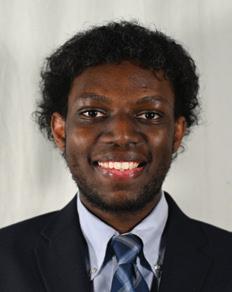
EUGENE NGINA
Correspondent
In the ordinary course of events, policies are designed to address problems and then fade away once those problems are resolved. DEI, despite its good intentions and occasional short-term successes, has failed to fulfill its promises.
High-minded ideals and a sincere effort to address historical discrimination against minorities in the United States culminated in the signing of Executive Order 10925 by President John F. Kennedy in 1961, directing government agencies and contractors to “take affirmative action to ensure that applicants are employed, and employees are treated [fairly] during employment, without regard to their race, creed, color or national origin.”
By the 1980s, this principle had expanded into the private sector as corporations adopted their own diversity initiatives, often in collaboration with universities, at a time when Critical Theory was gaining traction in academic institutions.
As these social theories became more influential, the focus of such policies gradually shifted from ensuring access to opportunity toward broader efforts to address ‘systemic inequalities,’ with bias training programs
continued from page 12
beling corrections to inequitable systems as DEI policies and education surrounding these systems as “Critical Race Theory,” the sentiment was tired.
President Biden signed Executive Order 13985 on his first day in office. The order for “Advancing Racial Equity and Support for Underserved Communities Through the Federal Government” established that “affirmatively advancing equity, civil rights, racial justice and equal opportunity is the responsibility of the whole of our Government.”
Five years prior, on New Year’s Day in 2015, one of the largest American consult-
emerging as a key method to counter what was perceived as implicit bias and structural racism within American institutions.
More often than not nowadays, DEI efforts lack a clear endpoint because the issues it aims to solve are continuously reborn and redefined in different forms to keep them going in one way or another.
Significant political, legal and cultural opposition has resulted because of this change from original intent, leading to the conservative backlash that was crucial to President Donald Trump’s 2024 reelection. His win, which was fueled in part by public dissatisfaction with DEI-related measures, represents a significant shift in the national dialogue on corporate activism, identitybased initiatives and the larger cultural war.
People who had little to no understanding of what it was or how it even operated were drawn to rhetoric such as “DEI” being short for “didn’t earn it.”
To avoid being less than candid, I’d argue that it’s genuinely difficult to find anyone who opposes the values embodied in the plain meaning of diversity, equity and inclusion. That, however, is not the real point of contention. The real concern with DEI is its inability to withstand scrutiny against the cliché, yet profound, ideal of a colorblind society in which individuals are treated without respect to their certain characteristics and without the artificial manufacturing of outcomes.
Indeed, many who have worked in institutions where affirmative action and DEI policies exist can attest that no one is hired solely because of their race, sex or nationality. Instead, these traits are framed as part of a holistic approach where that characteristic
ing firms — known for their work with Purdue Pharma and the Saudi Arabian government — McKinsey & Company, released a report titled “Why diversity matters.”
This report states that, “We know intuitively that diversity matters. It’s also increasingly clear that it makes sense in purely business terms. Our latest research finds that companies in the top quartile for gender or racial and ethnic diversity are more likely to have financial returns above their national industry medians.”
Plainly stated, DEI policies were simply a market trend. Now that we’re headed for a recession, the budget is too tight to keep pretending we care about equity. It’s time to focus on our own.
This is reflected by the return to Americana aesthetics in popular culture, Beyon-
is one factor among many, but never the deciding one.
Yet, this begs the question: If these characteristics are not supposed to matter in the final decision, why consider them at all?
The clearest example is race which is a trait that, in itself, is never a direct cause of ability, performance or potential. The core issue with DEI then is whether these factors are being treated as meaningful, whether benevolently or strategically. And if they don’t actually matter, why are they included in the equation in the first place?
In the long run, the social rejection of DEI that is embodied in politics today primarily runs on this critique.
Many argue — and I half-heartedly agree — that DEI policies seem to prioritize identity over qualifications, undermining institutional integrity and fueling skepticism about the legitimacy of hiring, promotions and college admissions. On the other hand, this may not be the case at most institutions. But many people, particularly college students, have serious concerns about the fairness of these entities and whether they are valued as much as their classmate who happens to be a certain demographic.
Employees and students are becoming increasingly resentful as a result, wondering if their accomplishments are evaluated based on personal merit or preset demographic standards. Businesses and institutions that aggressively promoted identity-based policies suffered financial losses and public reaction as a result of the “Go Woke, Go Broke” movement, which was sparked by the widespread notion that DEI undermines fairness.
Corporate shortcomings like the widely
cè’s country album should have come as no surprise to anyone paying attention to the subcultural trends of the 2010s.
Lana Del Rey is one of the most obvious and recent examples of a subcultural icon adopted by the mainstream. Her infamous “Question for the culture” Instagram post in 2020 claimed there wasn’t a place in feminism for delicate women like her. I’d say the popularity of Nara Smith rectifies this statement.
Moreover, the existence of Elon Musk demonstrates exactly what Americans want most, to have so much money that they can’t be held accountable — freedom.
To say Elon Musk is weird is an understatement. He’s a manchild who expects to face no consequences for what he says and does, going so far as to refuse the D.C.
talked about incidents with Bud Light, Disney and other businesses who supported DEI-driven advertising efforts have strengthened the notion that “woke capitalism” is not only turning off consumers but is also not sustainable.
If it were companies with a progressive stance, like Ben & Jerry’s, which openly supports abortion rights, or conservative ones like Hobby Lobby which is known for advocating against abortion, there would be no controversy whatsoever. Disney and Bud Light however, have had consistently neutral views on politics and these DEI initiatives feel so forced and fake that they don’t resonate well with the public.
Audiences who believe that traditional storylines and creative integrity have been compromised in favor of ideological messaging have resisted Hollywood’s emphasis on identity-driven casting and storytelling. Employees of companies that actively promoted DEI training programs, meantime, have started to voice their disapproval of work settings that put ideological views ahead of professional expertise.
I wonder what changed in the past two or three months?
Companies and institutions are now discreetly reducing their DEI activities in order to prevent backlash, lawsuits and a decline in public trust as legal challenges increase and public attitude changes.
If a single election was enough to send corporate America scrambling to reverse course, then perhaps their commitment was never about principle but about politics and the bottom line all along.
dress code.
While some people may recognize this kind of behavior as petty clout flexing, most Americans don’t stop to wonder why the wealthiest man on the planet feels the need to do anything besides count his stacks on an island somewhere. Instead they wish they were wealthy enough to buy a social media company they can use slurs on, as opposed to losing their job for doing the same. 2020 served as an awakening. It lets every voter who doesn’t value the collective action necessary to promote DEI — which, let’s face it, is most of us — know exactly what was on the ballot, and now we’re reaping the effects.
So go ahead and do what you want, there’s not enough funding to stop you.

Logan Lowery Correspondent
J.D. Vance stood behind the podium at the National Conservatism Conference three years ago as a U.S. Senate candidate and exclaimed, “We have to honestly and aggressively attack the universities in this country.” He was met with applause.
Vance, a graduate of Ohio State University and Yale University, was fresh on the political scene with a streak of blunt tenacity. Universities, he claimed, were adversarial to conservative values and stifled free thought.
Most importantly, according to Vance, universities “control” knowledge and truth.
To underscore the sentiment, the end of Vance’s speech directly echoed Richard Nixon’s five simple words from 1972, claiming the importance of the quote’s “wisdom”: “The professors are the enemy.” This serves as a reminder. The American right’s critique and condemnation of universities has long been a part of modern history — and it hasn’t been abandoned.
Nixon’s quote came amidst the domestic political unrest during the Vietnam War, a time in which many American universities were deeply involved in protest. Before that, the era of McCarthyism put a microscope on many professors, and often inaccurately, accused of communist sympathies.
History has shown us academic suppression.
From the blacklists of McCarthy to the book burnings of Nazi Germany, it’s always centered around what Vance said himself: control. And even though Vance’s speech was three years ago, it’s more relevant today than ever.
Universities have been framed as “Marxist indoctrination camps,” only interested in promoting liberal ideologies. The recent removal of DEI programs has caused an eruption of chaos, uncertainty and distrust within our nation’s most accredited universities.
That chaos is the attack against universi-

ties in this country. The removal of funding, even the threat of doing so, undermines academic freedom and institutional stability.
At the heart of all this, academia is the scapegoat for a liberal society; it always has been. Feminism, diversity values and progressive thought are all traced back to universities because, after all, that’s where the young people go.
On the surface, the right has a fear of academia. Underneath that, really, is a fear of change, complexity and loss of control.
These are all facts of life in academia and, really, everywhere. Our understandings are constantly shifting and dominant narratives or ways of thought can be continuously reassessed — that is the beauty and freedom of academia.
But J.D. Vance gets it wrong. Universities certainly lead the societal intellectual conversation, but they don’t — and can’t — control truth and knowledge itself.
No one can. And sometimes it seems like the right wishes it could.
There’s an understandable hesitance to the elitism surrounding university campuses. A degree costing thousands of dollars is unattainable for many, and academics are certainly imperfect when it comes to the accessibility of knowledge.
Additionally, liberals are easily overrep-
GRAPHIC BY RORY MOON
resented on college campuses across the board. Conservative students often feel they have to self-censor, and many conservative faculty fear backlash for their beliefs.
If this is the concern, though, the solution is not taking universities’ feet right out from under them. Sending these academic institutions — as liberal as they may be — into a spiral will only create further division and dysfunction.
What’s wrong is the right feels as if it’s getting left behind. Or, more specifically, like their values, the way they understand the world, is getting left behind.
However, in order for a society to move forward, for us to thrive, it’s necessary for things to change. For thought to change.
And what is more familiar with shifting thought than academia?
Professors are likely the most-equipped individuals to engage with truth and knowledge. There’s an understanding that truth is only to be found, rather than created, controlled or otherwise.
The notion that the United States’ political and social systems have systematically oppressed Black Americans resulting in lasting impacts on modern society is the truth, backed by countless facts and accounts. No academic created that truth: It simply is reality.
To be able to approach truth, you must be open to it in the first place, whatever it may look like.
Academia doesn’t have the perfect hold on truth. That’s why scholars argue about it all the time. But, if I can guess one thing for sure, a group of professors is more likely to grasp it than a kiss-the-ring politician.
Rather than being an institution of control, the university is an institution of challenge and debate, a necessary component of a democracy. Demonizing and suppressing academia is inherently dangerous, not only to the institutions themselves but to the livelihood of a democratic society.
An uneducated society — or at least a society without reverence for intellectual curiosity and debate — is an endangered society.
The right’s attempt to plunge universities into a state of chaos and force them to roll on their backs to cater to the ideological demands of the government creates a dangerous precedent.
Acting on fear of what doesn’t align with ideological or personal narratives will only stunt innovation and jeopardize democracy. If we really want to encourage free thought, banning words and threatening universities isn’t particularly the way to go.
American academia needs to change; it’s becoming increasingly clear. Fostering ideological diversity is crucial, but there have to be stable, respected institutions where that diversity can grow. “Attacking” and sowing fear in universities will do the opposite.
Marie Curie, a pioneering physics professor, once spoke of “understand[ing] more, so that we may fear less.” It’s time for us to create more space in universities for understanding diverse perspectives. And, on the other hand, it’s also essential to be open to understanding the truths academia nobly seeks.
Truth has never been about power. It’s about courageous discovery. I urge you to shy away from cowardice.
Representation is needed before genetic testing is useful

Jordan Birkner
NC State is a pioneer in genetic research, using cutting-edge technologies to study how genes impact people, animals and food. Genetic counseling is undoubtedly going to continue to be a prevalent topic in our community.
However, a lack of diverse samples in genetic studies and discussion of its role in our research is a much more pressing concern. Genetic predictions are only reliable for those the data is sampled from, and there is a white bias in genetic research.
Genes are passed from parents to their children, acting as the user manuals that tell our bodies how to function. Serious medical con-
ditions like cancer and diabetes have higher risks in certain people that can be identified through genetic testing. The convenience of a mail-in test can directly impact someone’s life, indicating whether their diet or lifestyle choices are more likely to cause life-or-death situations.
Genetic testing has real potential to help people; at least, the ones with access to accu-
rate assessments. Historically, those included as research participants are of European descent. By definition, groups that historically live close together share genes that other areas won’t because of the gene pool available. Generations will interact with medicine, diet and culture in different ways than other areas
This week, the UNC Board of Governors elected former NC State student body president, student athlete and vice chancellor Kevin Howell.
Technician is excited by this choice and optimistic about what it means for NC State. We commend the Chancellor Search Advisory Committee, UNC System and NC State for the election of Howell, who represents a promising future for the University.
The editorial board is impressed by Howell’s extensive and varied experience with NC State in an era where universities are increasingly hiring business executives and political pundits from outside the campus and higher education. Howell will become the third NC State graduate to ever lead the University and brings a wealth of experience informed by being a true member of our campus.
Howell was NC State’s first Black student body president and will be its first Black chancellor. He was a student athlete on the wrestling team. At his announcement event, Howell said he could never “have imagined the doors that would be opened for [him] because
of an NC State degree.” Howell is the archetypal member of the Pack and takes pride in it.
Howell is a graduate of NC State’s College of Humanities and Social Sciences, earning his bachelor’s degree in political science. The last few decades of NC State’s development have focused heavily on Centennial Campus and the expansion of our STEM fields; to have a leader with a humanities background is a breath of fresh air and a testament to the full, well-rounded nature of our University.
NC State had every opportunity to repeat the sins of its sister institution, UNC-Chapel Hill. The UNC System elected Lee Roberts chancellor of the university last summer, widely considered a political appointment at the behest of the Republican-controlled General Assembly.
Roberts came with little public education background and notoriously made a name for himself by staging a photo-op raising the American flag
continued from page 15
of the world.
No test can verifiably tell you whether or not you’ll develop a disease, but there are dangerous consequences of genetic data when the information is wrong.
False assumptions regarding genetic results can introduce health concerns. If someone receives an inaccurate high risk of a disorder, they may become overly cautious and second guess the world they interact with to the detriment of their own social or physical health. On the other hand, a false low risk assessment might lead someone to ignore potential symptoms that put themselves or others in danger.
Research from the Broad Institute of MIT and Harvard University affirms that genetic risk data isn’t always useful for diverse popu-
lations. Genetic risk accuracy was compared around the world and international populations were found much less likely to get reliable genetic predictions compared to European descendants.
For example, African populations are shown to average around five-fold lower genetic prediction accuracy. This means that only one in five people of African descent will receive useful genetic risk information. The dangers of falsely believing one will or won’t develop a disease are significantly increased based on ethnicity.
Genetic testing is also often inaccessible in historically marginalized communities due to cost and availability. This puts diverse populations at even more of a disadvantage.
flanked by a police force beating his students to a pulp. His election was broadly opposed by students, whose voices were seemingly ignored in an irregularly hasty appointment process.
In the end, the robotic Roberts is as disconnected as he can be from UNC’s student body. It was only natural for the prospect of a chancellor search at NC State to bring anxieties of a repeat.
Meanwhile, Howell feels more connected and in-tune with NC State than we ever could have imagined the Pack’s new chancellor to be.
While Roberts feels like he’s been dropped in a foreign country and being forced to occupy it, Howell feels like an old friend coming home. In his speech, he talked about his experiences at NC State, specifically the moment his father drove him from his childhood home in Shelby, North Carolina to Raleigh. It’s a moment we all remember, something we can all relate to, much like the rest of Howell’s experiences at NC State.
These experiences make Howell genuine and authentic, something that can be taken for granted in spheres such as higher education and politics. We’ve been lucky to experience the pure likability of Chancellor Randy Woodson, so we’re thankful the Chancellor Search Advisory Committee also recognized the importance of these traits when making its decision on our 15th chancellor.
While Howell will undoubtedly face tough decisions that have the capacity to make or break his tenure as chancellor, his decades of experience at the University and down-to-earth qualities make us hopeful that he will handle those challenges with the care and compassion they will undoubtedly require.
We can’t know what challenges may face our University, but we can prepare for them by boasting a leader who we trust to address whatever comes our way with the best interest of the students at the forefront of their decisionmaking.
These disparities impact how individuals live their lives and healthcare itself. Accurately understanding risk allows providers to monitor early symptoms and prepare relevant medical support.
I have a family member with Celiac disease and know how important early detection is to avoid health complications. Celiac is an immune disorder linked to brittle bones, infertility and nervous system issues. Thankfully, avoiding eating the gluten found in breads and grains prevents many health issues.
As a white person of European descent, it’s easy for me to use genetic testing to see if I need the same dietary restrictions as my family.
Genetic testing is over 99% accurate in determining whether sweet treats like cake and croissants would put someone’s health in danger. It’s also a far less invasive and risky option than swallowing a camera or having doctors
slice directly into one’s gut to test for Celiac. Genetic tests can impact health outcomes for the better. Identifying genetic risk has changed the way we detect and care for physical health and medicine, catching early signs of cancer and other diseases.
Tests for Celiac, heart disease and other gene-influenced disorders were developed using people like me. But this information isn’t going to be useful for everyone until we ensure studies include and emphasize diversity. Genetic research advances are only as good as their representation and accessibility. While NC State doesn’t currently offer genetic counseling, the practice connects closely with our university’s genomics research and sequencing services. Our community needs to recognize that the people we leave out are just as important as those we include; otherwise, scientific advances can endanger those it intends to help.
Matthew Burkhart News Editor
The Atlantic Coast Conference reached a settlement with Clemson and Florida State, resolving a year-long contentious legal dispute over revenue distribution and exit penalties.
Clemson and Florida State sued the conference over issues related to revenue distribution and exit penalties. The schools sought to challenge the conference’s grant of rights agreement, which required them to pay substantial fees and surrender media rights if they chose to leave the conference before the agreement’s expiration in 2036. This led to a legal dispute as both schools explored potential membership in other conferences, seeking more equitable revenue sharing and flexibility in their media rights.
The settlement introduces a “brand initiative” that will distribute 60% of the ACC’s media revenue based on a five-year rolling average of viewership. This means schools with higher viewership, such as Clemson and Florida State, will receive a larger share of the revenue. The remaining 40% will be distributed evenly among all member schools.

some of these schools.”
Paul Haagen, a professor in sports law at Duke University, said NC State would likely be among the universities being hurt by this model. He said NC State, while consistently competitive, is not typically among the top performers in the ACC regarding revenue sports — football and men’s basketball.
As the ACC’s new revenue distribution model takes effect, NC State faces significant financial challenges.
Historically, most conferences have distributed revenue evenly among member schools. However, as the financial gap between the ACC and other power conferences like the SEC and Big Ten grew, schools with strong brand recognition in the ACC began seeking a more equitable share based on their success and viewership.
“The idea was that they are the swum of their parts; not the individual parts,” said David Hale, an ESPN college football journalist who reported on the settlement.
While some schools could see a greater influx of funds from the conference, Hale said this new model could be detrimental to other schools.
“The schools who are not going to benefit, actually are losing money from what they had originally gotten,” Hale said. “ … This is actual losses. They’re going backward, for
Hale said this new model implies that universities will likely funnel more investments into their revenue sports teams. He said this can be done through either raising student fees, finding new fundraising opportunities or cutting funding for other programs.
Hale said NC State has already started new fundraising opportunities when it sold the naming rights to the athletics director position for $5 million earlier this year. NC State Athletics has also partnered with Independent Sports and Entertainment to find a partner to sell the naming rights of Carter-Finley Stadium.
Following unsuccessful attempts at cutting sports programs during the COVID-19 pandemic, Hale said it is more likely that universities will divert funds from Olympic and women’s sports, rather than cutting their programs entirely.
“Where you’ll probably see the biggest impact is that instead of flying charter, they’re flying commercial,” Hale said. “And instead of paying your head coach $900k a year, you’re paying them $250k a year. Instead of building a new facility for your swimming and diving team, they’re going to go another 10 years in their dilapidated facility. Those types of things are where I think the biggest impact will show up.”
Haagen said the new distribution model
only exacerbates the current situation in which revenue sports are already given priority, especially while universities await the implementation of the parameters set by the House v. NCAA, which will allow universities to distribute up to 22% of their revenue to their student athletes.
“If [the House v. NCAA settlement] gets approved, given the distribution model in the settlement, you’re just taking a fifth of the significant revenues of the athletic department, and you’re spending that on the athletes, that just means you’ve got fewer resources to spend in other places and more pressure to generate as much as you can out of those programs that generate money or might generate money,” Haagen said. “Many of them lose a lot of money. So I think the incentives haven’t changed, they’re the ones that were in place before all of this. They’re just getting much more intense.”
The settlement also significantly reduces the exit penalties for schools looking to leave the ACC. Previously, universities would have faced a penalty of three times their operating budget plus control of their media rights. It would’ve cost Florida State $572 million to leave the conference before the settlement.
Under the new agreement, the exit fee will start at $165 million next year and decrease annually, reaching $75 million by 2030-31. Schools that pay this fee can leave with their media rights intact.
“What I think this is, is buying time for the ACC to adjust to the new environment,” Haagen said. “And possibly to change in ways that would make it either more attrac-
tive to stay or a recognition that it’s going to go the way of the PAC-12 at the end.”
Haagen said these eased penalties make it “extremely attractive” for schools like Florida State, who have already shown interest in joining another conference, to leave the ACC, along with the conference’s present shortcomings.
“[The ACC] ended up with a group of schools that don’t actually fit well together and don’t constitute an extremely attractive package to sell, and it’s also that the deals they got from ESPN are just much less, much less lucrative than the [SEC and Big 10].”
As the ACC’s new revenue distribution model takes effect, NC State faces significant financial challenges. The school, which has historically been competitive but not a top revenue generator, may see a reduction in its share of conference funds. This could lead to difficult decisions regarding budget allocations within the athletic department.
NC State has already begun exploring alternative revenue streams. However, these efforts might not fully offset the potential losses from the new model. The University may need to consider further cost-cutting measures or fundraising strategies to maintain its athletic programs.
The broader implications for NC State include potential impacts on non-revenue sports and student-athlete support. As universities prioritize revenue-generating programs, there may be less funding available for Olympic and women’s sports. Additionally, the pressure to generate revenue could lead to increased reliance on student fees or private donations.
Daniel Susann Staff Writer
National media pundits, the social media burner accounts and your lame uncle all have a lot to say about NC State men’s basketball head coach Kevin Keatts’ firing. After all, how could NC State fire its head coach after he guided it to its first ACC Championship since 1987 and its first Final Four appearance since 1983?
Keatts led a team that made it through some of the toughest in-game situations in the sport — winning five games in five days for the ACC title, taking down March Madness darlings Jack Gohlke and Oakland in overtime and beating a UNC-Chapel Hill team that already beat the Pack twice in the regular season.
Does Keatts not get any credit for all this? For bringing a conference championship back to Raleigh, which had not been seen in any revenue sport since the ‘90s?
Not according to Athletic Director Boo Corrigan.
When NC State entered the ACC Tournament last year, it seemed like Keatts needed to win the whole thing to keep his job. Well, he did just that, securing an automatic contract extension and raise, and seemingly guaranteed job security. All he had to do was tread water to prolong his tenure. Instead, he sank — all the way to the bottom of the ACC with a 12-19 record that included no road wins, along with being one of the three teams that missed the ACC Tournament.
Great coaches get the most out of their players — something that Keatts couldn’t achieve during his tenure, outside of the storied ninegame stretch last year. Throughout the 202324 regular season, the pieces were there but never seemed to fit together. Some of the same players that helped take down Duke, UNC and Marquette in high pressure elimination games during last year’s NCAA Tournament, finished with a losing record in ACC play before the miracle run to the Final Four.
That’s a coaching issue.
This season, there was a lack of talent. Another responsibility of the coach. Keatts even admitted so in a press conference after NC State’s loss to Duke on Jan. 27.
“We don’t have a superstar,” Keatts said. “We’ve got a bunch of really good players that obviously need each other to play well, and so we don’t have that closer in every game.”
In previous years, the talent was there but the Pack couldn’t get out of its own way. The standard for Keatts was mediocrity. But this is not why Keatts was fired. Just look at the situation with the football team, where mediocrity has not only been tolerated, but celebrated.
Keatts had to go because he blew his chance to elevate NC State back to a permanently competitive team in the ACC. With increased attention and momentum after becoming ‘America’s team’ and increased financial investment, Keatts could have parlayed his success into something more substantial and less fluke-like.
Instead, everything he gained, besides a
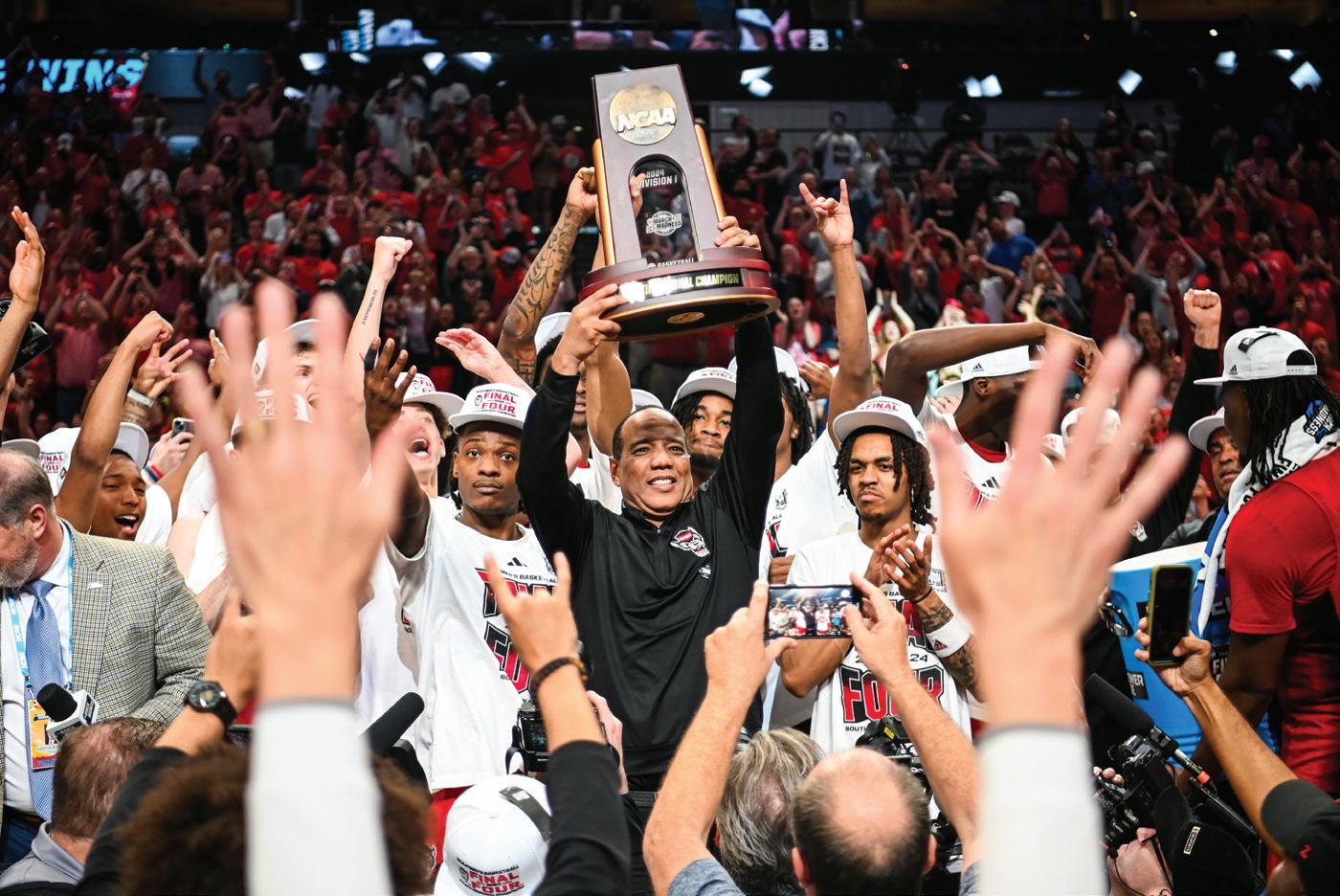
huge stack of cash and a ring, was washed away with the team’s performance this season.
NC State’s run embodied everything that is great about college basketball — an underdog with its back against the wall, defeating an arch rival to take home its first conference championship in decades, with a coach that was on his last straw.
A cast full of journeymen and rejects at a basketball program that was sputtering, at best, came together and toppled giants with
five-stars and incomparable cash flow. Corrigan firing Keatts proved that it was all just a fluke. The school had no idea how Keatts got to the Final Four, and no confidence that he could ever find his way back. But that is what made it so special for fans. Nobody saw it coming, making victory that much sweeter. Keatts gave fans a taste of what NC State basketball could be, even if he couldn’t sustain it. And now the hope is someone else can turn that fleeting, chaotic magic into something real.
Daniel Susann Staff Writer
Expectations were high going into his 2024 season. Then-sophomore left-handed pitcher Dominic Fritton was coming off of a stellar Freshman All-American campaign, quickly becoming one of NC State baseball’s best arms.
Fritton boasted a .211 batting average against and had the lowest ERA among starting pitchers with 3.59 in his freshman season. In ACC play, he led all NC State pitchers with 56 strikeouts and recorded two saves. He was everything and more that one could ask for from a young pitcher. So the expectations were high going into his sophomore campaign but year two held
a different story. His production dipped instead of improving. Fritton’s ERA rose to 7.64, and he never seemed comfortable on the mound. Every struggle compounded the pressure. It all came to a head in Fritton’s start in the College World Series when the Florida Gators got to him early in the second inning, putting up four runs to dig the Wolfpack’s grave in an eventual 5-4 defeat.
Fast forward another year, and there was still pressure for him to return to his freshman form. But now, Fritton is the veteran starter with College World Series experience. How would he handle the pressure of being the number one guy?
No matter what, head coach Elliott Avent has stuck with Fritton, knowing
that he would get through the challenges — a meaningful deed for a player who was down on his luck.
“It means a lot to me that they stuck with me throughout the year despite all the struggles,” Fritton said at media day in January. “It made it easier to come back here knowing I’d have the opportunity to get better.”
It is safe to say that Fritton has gotten past the struggles of 2024. It is early in the season, but his ERA is just 1.26, by far the team leader. Fritton ranks fifth in the ACC in ERA, while having the second most innings pitched, demonstrating his dominance thus far.
Even as Fritton remained at the top of the conference statistically, the team struggled
for a short stretch, posting a five-game losing streak. Giving up five runs and six walks against Ohio State at the Jax Classic, albeit four of the runs unearned, was a low point in the season for Fritton.
“Since that Jacksonville weekend, I think we kind of came together as a team and wanted to have more fun,” Fritton said. “I think we were putting a lot of pressure on ourselves early, and now we’re all just having fun. We’re all enjoying being out on the field and putting the work in.”
Much like his sophomore season, Fritton was feeling the pressure bestowed upon the team by pre season rankings and the attention that comes with it. Since that loss to Ohio State, Fritton has given up just three runs in 19.2 innings pitched,
Connor VanDerMark Assistant Sports Editor
Four months ago, all hope seemed lost for NC State women’s basketball. Sitting at 4-3 without a win against a Power Four school, it seemed as though this iteration of the Wolfpack didn’t have what it took to repeat last year’s Final Four run. But head coach Wes Moore has the fourth most all-time wins amongst active D1 college coaches for a reason.
Fast forward to today and the Wolfpack sits just six games away from greatness. Not only did it turn its poor beginning of the season into a 26-6 overall record, a 16-2 conference record and an ACC regular-season title, but NC State was named a No. 2 seed in the NCAA Tournament, meaning it gets to host the first two rounds of its region for the fifth time in the last six seasons.
“I’m proud of this team for being able to secure a home bid,” Moore said. “That’s probably the thing that keeps me up at night more than anything else, trying to secure one of those top 16 spots and that’s based on your body of work for the whole season. Every game is so critical. I’m proud of this team for being able to put themselves in that position.”
Home court advantage is valuable, but for NC State, it’s everything. The Wolfpack went undefeated during the regular season when playing in Reynolds Coliseum and holds a 21-game home win streak dating back to last season. With the Wolfpack faithful roaring it to victory, the red-and-white is one of the hottest teams in the nation. But Moore knows his team can’t take it for granted.
“It’s great to be at home,” Moore said. “It’s great that our team has earned that oppor-
including a complete-game victory over Virginia Tech, giving up just one run.
“It’s special to me because I know what he turned down last year to come back to NC State,” Avent said. “I know what that meant to him, and I know how hard he worked in the off-season. … So when a player works that hard, you don’t always get rewarded in this game. This game is not an equal opportunity place where — hey, I do this. I want this — that’s not the way baseball works. And to see him get rewarded is pretty special to all of us.”
After his freshman campaign, Fritton ranked No. 56 on D1 Baseball’s draft prospect rankings. And if Fritton continues this stellar season it could put him in a prime position to play in the big leagues.
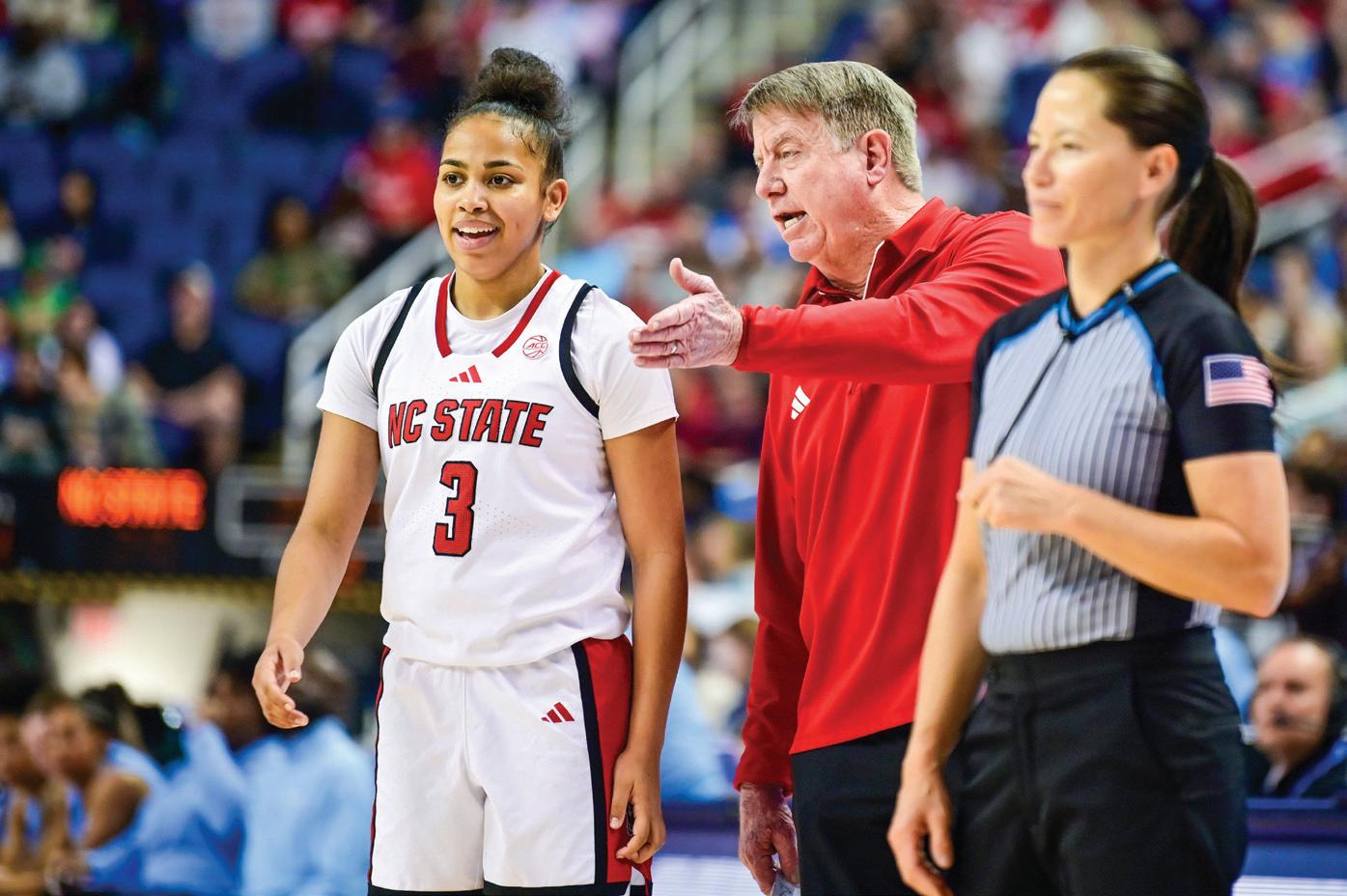
tunity for us, but at this point, that doesn’t guarantee you anything. You got to go out and perform.”
Though it faces a No. 15 seed in the first round, Vermont isn’t a team to be trifled with.
The Catamounts hold claim to the fourth-best scoring defense in the nation, holding their opponents to just 52.2 points per game. Furthermore, NC State is catching Vermont at its hottest. After beginning the season with a 5-10 record, Vermont won 16 of its final 18 games.
If there is one thing that NC State fans learned from last year’s Final Four run, it’s that momentum is everything in college basketball.
“There’s a lot more parity in our game,”
Moore said. “Last year, we were fortunate. We got hot and got on a roll and went through the juggernaut of Tennessee, Stanford and Texas to get to the Final Four. I think there’s more parity in our game and more excitement.”
The Spokane, Washington region is filled with a plethora of talented interior scorers, including No. 1 UCLA’s Lauren Betts, No. 3 LSU’s Aneesah Morrow and No. 4 Baylor’s Aaronette Vonleh. For NC State to emerge from its region victorious, it will need to rely heavily on its freshmen, especially forward Tilda Trygger and center Lorena Awou — two key cogs in NC State’s turnaround from its early struggles.
As freshmen, Trygger and Awou were supposed to come off the bench and learn from their veteran counterparts. But Moore’s hand was forced after injuries to his other post players, forcing his freshmen to grow up fast. It took a couple of games, but Trygger is playing her best ball of the season. She looked confident and composed against UNC-Chapel Hill in the ACC Tournament, scoring the Wolfpack’s first eight points. As for Awou, her size and physicality will be required to slow down those dominant post players and give the Wolfpack defense a fighting chance.
“Those kids have stepped up,” Moore said. “Think about them being in the fire in some big games this year and coming through. It’s pretty amazing for freshmen. It’s gonna be their first time to dip their toes in the NCAA waters, so it’s going to be a big challenge as well.”
More than anything, spirits are high in Raleigh. The team was shown dancing in celebration after hearing its name called during Selection Sunday. The excited buzz that once flooded the City of Oaks last season has returned. Amidst brackets, upsets and everything else that comes with college basketball in March, Moore knows an upbeat team is the key to success.
“Some people call it March Madness, but I like calling it March Gladness,” Moore said. “This is what you’ve worked for all year. Our kids are really excited and they’re used to playing in big games and performing on the stage. I feel good where we’re at.”
NC State women’s basketball begins its quest for greatness Saturday against Vermont. Tipoff is set for 2 p.m. and will be streamed on ESPN.

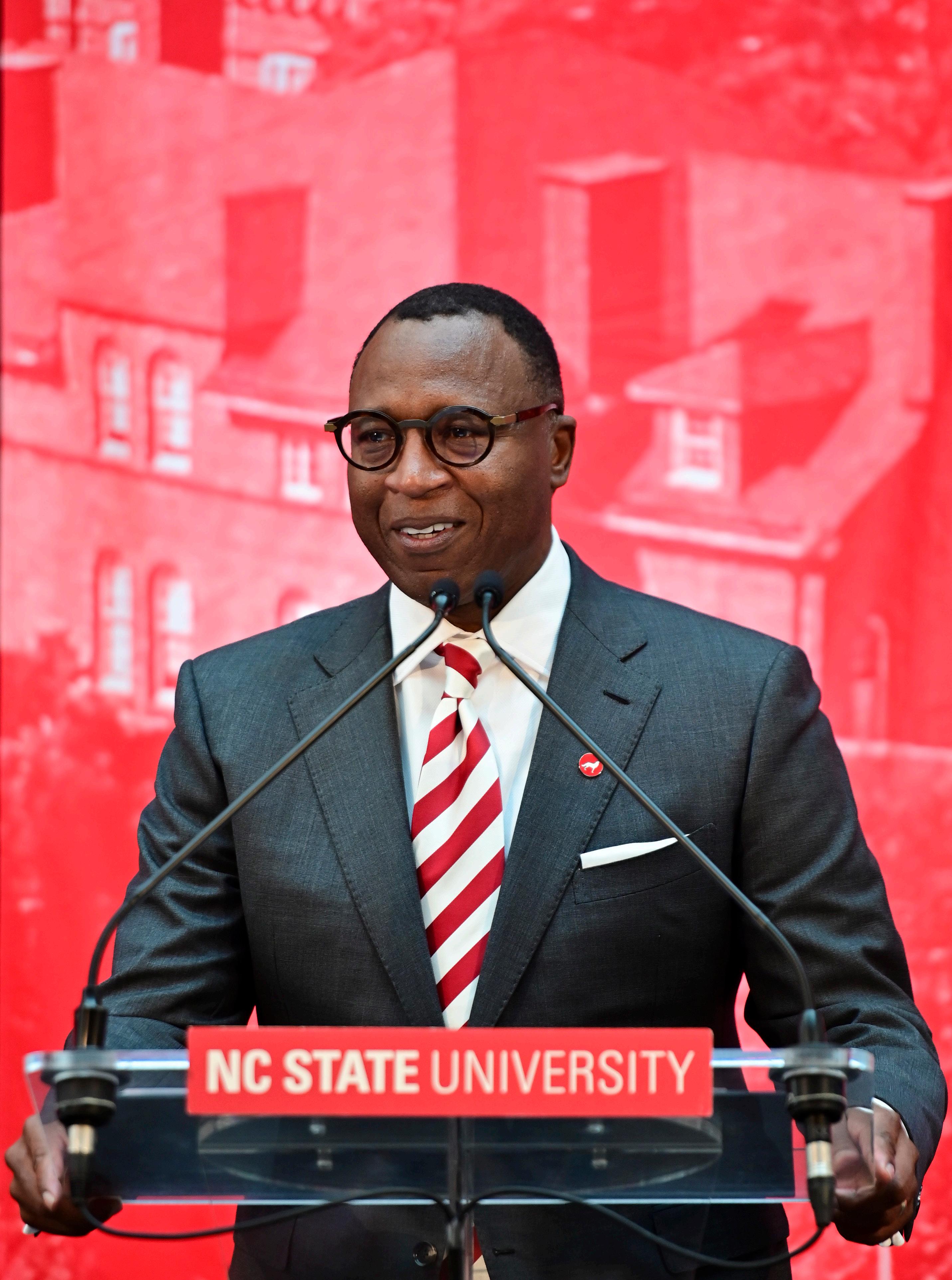
See pages 4, 16